Smart Traveller 4+
Global airport rewards, arrture group ltd, designed for iphone.
- 3.0 • 1 Rating

iPhone Screenshots
Description.
Smart Traveller, our Global Airport Rewards Programme, gives every traveller a reason to reward themselves effortlessly at every interaction when on the go. Dedicated to help immerse and reward each time you enjoy premium airport services of Plaza Premium Group. Smart Traveller opens up a world of privileges to make travelling with us even better. From a well-needed rest in our premium lounges, to satisfying a dessert craving before boarding in one of our restaurants, or a nap between flights in our hotels, whether it is for business or pleasure, or on departure, transit or arrival at the airport, we reward you for travelling smart. Become a Smart Traveller today. Download and register the Smart Traveller mobile app to navigate and enhance your airport experience. Be a Smart Traveller. Travel Smart, Travel Better. Commited to make your travel experience better, the brands by Plaza Premium Group is a staple of international premium airport service experiences globally. The Group strives to make the airport experience exceptional for all travellers, going beyond expectations whether at departure, in transit or through arrivals. The Group comprises four core airport services, Airport Lounge, Airport Transit Hotel, Airport Meet & Greet and Airport Dining. Unlock your travelling experience with Plaza Premium Group as a Smart Traveller. Begin your discovery at over 50 Plaza Premium Lounge and Plaza Premium First brands across the globe, as well Root98 in Hong Kong and Canada, plus Flight Club in Malaysia.
Version 2.6.7
We made periodic improvements to the app to deliver an even better Smart Traveller experience.
Ratings and Reviews
App privacy.
The developer, Arrture Group Ltd , indicated that the app’s privacy practices may include handling of data as described below. For more information, see the developer's privacy policy .
Data Linked to You
The following data may be collected and linked to your identity:
- Contact Info
- Identifiers
Data Not Linked to You
The following data may be collected but it is not linked to your identity:
- User Content
- Diagnostics
Privacy practices may vary, for example, based on the features you use or your age. Learn More
Information
English, Simplified Chinese, Traditional Chinese
- App Support
- Privacy Policy
More By This Developer
ISG PORTPAL
You Might Also Like
Cathay Pacific
My HKG (Official)
Airport Companion
Hong Kong Airlines
永安旅遊 - 機票、酒店、自由行、旅行團
Malaysia Airlines
- Advertise with us

- Headline News
- Business News
- Coronavirus (Covid-19)
- Global Travel Connoisseur
- Airfare Deals
- Black Friday / Cyber Monday Sales
- Competition
- Cruise Deals
- Hotel Deals
- Industry Deals
- Travel Deals
- NORTHERN TERRITORY
- SOUTH AUSTRALIA
- WESTERN AUSTRALIA
- OTHER States
- COOK ISLANDS
- NEW ZEALAND
- Destination Global
- Middle East
- South Pacific
- North Asia News
- Oceania News
- Dining | Restaurants
- Food & Beverage
- Hotel Features
- Lifestyle Features
- Travel Feature
- Destination Feature
- Hotel Developments
- Hotel Openings
- Hotel Trends
- Resort News
- Luxury Hotels
- Serviced Apartments
- Health and Wellness
- Lifestyle News
- Travel Goods
- Conferences
- Exhibitions
- Events Calendar
- Trade Events
- Movers & Shakers
- Cultural Tourism
- Agents Incentives
- Eco-Tourism
- Golf Tourism
- Medical Tourism
- Travel Advisors
- Responsible Tourism
- Rural & Agri
- Sustainable Tourism
- Theme Parks
- Tourist Boards
- Tour Operator
- Travel Warnings
- CRUISE NEWS
- Adventure Cruises
- Car Rentals
- Cargo & Freight
- Cruise News
- Expedition Cruises
- Motor Cycles
- Recreation Vehicles
- River Cruising
- Association
- Social Media
- Statistics & Trends
Select Page
Smart Traveller: A new global membership programme making the return to travel better in 2022
Posted by Chisa Boonmee | Apr 1, 2022 | Apps , Headline News | 0 |

Powered by Plaza Premium Group (PPG), the world’s largest airport hospitality group that constantly strives to Make Travel Better , the personalised digital solution seamlessly combines all of the Group’s hospitality offerings into one easy-to-use app. Members can also enjoy rewards, exclusive offers, benefits, and service packages from PPG and partners, all on the platform.
- BECA Delivers message of continued pain and uncertainty to the Federal Opposition
- Nicole Rogers Named Executive Vice President/Chief Sales Officer with San Francisco Travel
- “10 out of 10 vintage” to be celebrated at 2023 Hunter Valley Wine & Beer Festival – Saturday 24 June, 2023
- Korean Air to trial IATA Travel Pass
- Saudi Arabia leads the world in projected hotel supply growth
- Napier, New Zealand Opens Its First Internationally Branded 5-Star Hotel, Swiss-Belboutique Napier
- Romantic Valentine’s Day Stays: Deals & Packages!
- Staah Reveals The Top Online Channels For 2020
- Brisbane Airport welcomes two-way trans-Tasman travel bubble
- Lauren Bruggemans Joins Visit Greater Palm Springs as Director of Sustainability and Community Engagement
Share this:
Leave a reply cancel reply, subscribe to our newsletter.
Subscribe to our newsletter!
- Australian Capital Territory
- Breaking News
- Cook Islands
- Faith Tourism
- New Caledonia
- New South Wales
- New Zealand
- Northern Territory
- Philippines
- Saudi Arabia
- Solomon Islands
- South America
- South Australia
- Space Tourism
- Western Australia

Sponsor/Partners

Advertisement

Popular Posts
- February 2024
- January 2024
- December 2023
- November 2023
- October 2023
- September 2023
- August 2023
- February 2023
- January 2023
- December 2022
- November 2022
- October 2022
- September 2022
- August 2022
- February 2022
- January 2022
- December 2021
- November 2021
- October 2021
- September 2021
- August 2021
- February 2021
- January 2021
- December 2020
- November 2020
- October 2020
- September 2020
- August 2020
- February 2020
- January 2020
- December 2019
- November 2019
- October 2019
- September 2019
- August 2019
SUBSCRIBE NOW
* You will receive the latest news and updates on your favorite celebrities!
Trending News
Charles sturt university student gains valuable insights from timor-leste agriculture study tour , timor-leste acts against potential human trafficking: prevents youths traveling to cambodia , timor-leste president advocates for india as permanent member of reformed un security council , over 100 displaced by heavy rains in dili, timor leste , timor-leste and wfp join forces to support pregnant and lactating women , timor-leste prime minister xanana gusmão indicates government reshuffle in march .

Smart Traveller: Register Your Travel for a Smarter Adventure!
Are you gearing up for an adventure? Want to ensure your travel is not only smooth but also smarter? Look no further than Smart Traveller! Registering your travel with Smart Traveller is the savvy choice for any Aussie explorer. From essential updates to vital advice, the Smart Traveller service is your go-to destination for staying informed and safe on your globetrotting journey.
How do I register my travel on smart Traveller?
To keep updated with the latest travel advice and news for your destination, simply subscribe to receive alerts rather than registering your trip. Subscribing ensures you’re informed about any changes or updates that might affect your journey. Stay in the know and enjoy a safer travel experience!
How do I start a travel account?
To kick off a travel account, begin by picking a catchy and straightforward username. Once that’s sorted, hone in on your distinctive style and angle—this will be your personal narrative. Master the art of photography since captivating images are the bread and butter of any successful travel profile. Hook your audience with interactive content and stay active within the community. Spice up your posts with trending travel hashtags to increase visibility. Dive into Instagram Stories and Live features for real-time engagement. And don’t forget to connect with fellow travel enthusiasts—networking can open doors to new adventures and followers. Remember, consistency is key to keeping your followers intrigued and your account buzzing with activity.
What do I need to declare in Australia?
When entering Australia, you need to declare any goods exceeding the duty-free threshold of AUD $900 for adults and AUD $450 for children. This includes items you’ve purchased abroad or from a duty-free shop in Australia. Be mindful of prohibited or restricted items such as certain medications, steroids, firearms, weapons, illegal pornography, and illicit drugs. It’s crucial to comply with these regulations to ensure a smooth journey while keeping aligned with the Smart Traveller guidelines.

Do I need to register travel with DFAT?
No, it’s not compulsory for Aussies heading overseas to log their travel plans with the Department of Foreign Affairs and Trade (DFAT). If you’re eager to get back Down Under, keep in close touch with your airline or travel agent to suss out your options for flying home.
How do I authenticate a DFAT document?
For a DFAT document to be authenticated, take it to the Department of Foreign Affairs and Trade, where they’ll verify the signature or seal against their database. Following this, they’ll provide you with either an Apostille or an Authentication certificate, depending on the destination country’s requirements. This certification is necessary for the document to be recognised overseas, ensuring smooth sailing for your international engagements.
What document is required for international travel?
For international travel, you’ll need a passport, sometimes complemented by visas depending on your destination. Other valid documents might include a U.S. permanent resident card, a Stateless travel document, a Re-Entry Permit if you’re returning to the U.S., or a NEXUS card, which expedites travel between the U.S. and Canada. For those at sea, a U.S Merchant Mariner Card is acceptable; military personnel can use their military ID. In urgent circumstances, an emergency travel document from an embassy or consulate can facilitate your journey. However, it’s important to note that U.S passport cards cannot be used for international air travel—they’re only valid for land and sea border crossings. Before setting off, check with reliable traveller advice platforms to ensure your documents align with your destination’s requirements. More info
How do I contact Smart Traveller Australia?
To connect with Smart Traveller, the Australian Government’s travel advisory and consular assistance service, simply utilise the online enquiry form for non-urgent matters. If you need to speak to someone directly and you’re in Australia, give them a buzz on 131 232 from Monday to Friday, during the hours of 8:00 am to 5:00 pm. Should you be abroad, reach out to the nearest Australian Embassy, High Commission, or Consulate for assistance tailored to Australian travellers. Remember, registering your trip with Smart Traveller keeps you informed and safe on your travels.
Does smart traveller australia have an app?
Absolutely! Smart Traveller Australia offers a mobile application designed to improve your travel experience. You can effortlessly download it and register to access a range of features aimed at making your journey smoother and more enjoyable. Whether it’s flight updates, navigational assistance at the airport, or travel advice – it’s all at your fingertips with the Smart Traveller app.
What app do I need to download to travel to Australia?
To travel to Australia, you need to download the Australian ETA app if you hold an ETA-eligible passport. This app enables you to apply for an Electronic Travel Authority (ETA), a crucial step in preparing your journey. Should you find it challenging to use the app, another option is to lodge a visa application through ImmiAccount online to find a visa that fits your travel needs. It’s a smart move to acquaint yourself with the app or online process in advance to ensure your Aussie adventure begins smoothly. More info
What is the app for Australia entry?
For those planning to enter Australia, the required app is the Australian ETA app, which caters to all eligible jurisdictions. If you satisfy the ETA conditions, you can easily apply via this digital platform. To get started on your smart traveller journey, simply visit the relevant app marketplace, be it Apple’s App Store or Google Play for Android users, and download the Australian ETA application. Enjoy a hassle-free process to register your travel!
What app do I need to download to travel?
G’day mate! For a bonza travel experience, you’ll want to load up your smartphone with some top-notch apps. First up, grab Google Maps to help you navigate the streets like a local. Keen for a getaway? Skyscanner will be your go-to for sniffing out the best deals on flights and accommodation. If you’re not sure what to chuck in your bag, PackPoint’s a ripper for packing smart according to your destination and the weather. And don’t go past Tripadvisor to help you suss out the best spots and travel tips. Safe travels and don’t forget, registering your trip with Smart Traveller is a wise move to stay informed and safe while you’re off adventuring! More info
What is the purpose of Smart Traveller?
Smart Traveller is designed to support Aussie globetrotters by keeping them up to date with comprehensive travel advisories and guidance for various international destinations. When you register your journey with Smart Traveller, you’re signing up to receive critical information to help ensure your trip is as safe and informed as possible. Whether it’s tips on local customs, health precautions, or updates on changing travel conditions, Smart Traveller provides an essential lifeline for Australians on the move abroad.
Should I register with Smart Traveller?
Absolutely, it’s wise to sign up with Smart Traveller for the places you’ll be heading to and those you’ll be passing through. Even though they ceased pre-trip registration back in 2019, staying informed through their updates can be pivotal for a safe and smooth journey. It ensures you have access to the latest travel advisories and essential information for your destination.
How much does it cost to join Smart Traveller?
Joining Smart Traveller doesn’t cost a penny – it’s completely complimentary! Get savvy with your travels and enrol at no charge to stay informed and secure on your adventures.
What is a Level 3 country?
A Level 3 country is one where you’re advised to rethink your plans due to significant threats to personal safety or security. Before organising a trip to such a destination, it’s wise to check updates and consider the implications on your well-being, potentially altering your travel agenda. Engage with advice from smart traveller resources to stay informed about the risks involved. More info
In the world of travel, staying connected and informed is key to a successful and enjoyable adventure. If you’re planning a trip, registering your travel with Smart Traveller is an absolute must. By signing up, you gain access to essential guidance, travel advisories, and updates that can make all the difference for a safe and informed journey. It’s all about making your travel experience smarter and more secure. So, be sure to hop on board and join the Smart Traveller community for your upcoming travels!
Timorese Police Issue Warning on Fireworks Usage for New Year's Eve Only
The Ultimate Purpose of Travel List: Uncover Your Wanderlust Goals!
Related posts
Wear a baby carrier through airport security: your ultimate guide , discover the wonders of e-travel philippines: an unforgettable adventure , discover the magic: disneyland singapore’s ultimate adventure , the ultimate purpose of travel list: uncover your wanderlust goals , discover the ultimate ferries to fraser island adventure , unveiling the unbeatable: samsonite’s superior luggage delights aussies , stay connected.
Username or Email Address
Remember Me
Registration is closed.
5 Smartphone Apps To Keep You Safe When Traveling Abroad
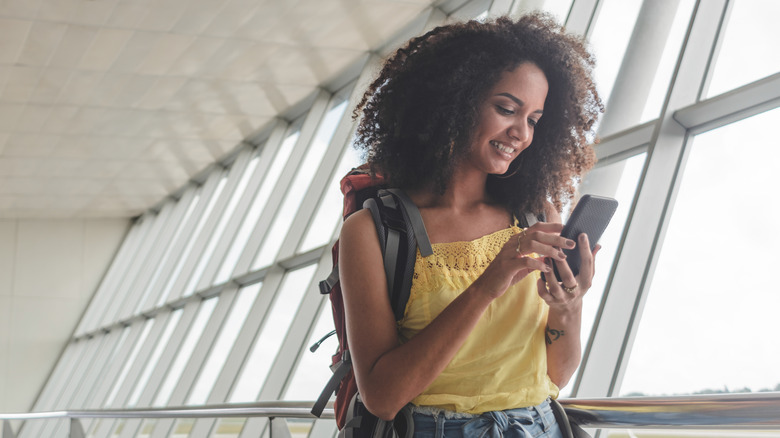
You have an international trip coming up, and you're excited and maybe a little nervous, which is understandable. After all, you get to immerse yourself in unfamiliar sites and experience a new culture. Traveling to a new country can be a daunting experience. However, smartphones have made it easier, given that you can book last-minute air tickets to different cities after you've reached your primary destination, look up the best local spots to eat, walk to nearby attractions, and even learn the local language through apps like Duolingo and Babbel.
That said, despite how well you may have planned out your travel, things can still go wrong. Fortunately, though, there are a number of apps that are designed to keep you safe while you're traveling abroad. SlashGear has listed some of these apps below, based on user reviews and first-hand experience. You'll also find a detailed methodology that explains how these apps were evaluated and selected toward the end of this list.
Although people usually download and use VPNs on their phones to access geo-restricted content, the fact is that VPNs offer so much more than just a workaround to stream your favorite movies and TV shows. In fact, a reliable VPN service like NordVPN ( Android | iOS ) can help protect your online activity and private information by routing your data through a remote server, reducing the chances of sensitive information falling into the wrong hands. Additionally, NordVPN has a strict no-log policy — this means your private information is not collected or stored on NordVPN's servers.
What makes NordVPN an especially good choice for travelers is that it offers some of the best connection speeds while you're abroad. It also gives you access to over 6,000 remote servers across 61 countries. Moreover, when you sign up for NordVPN, you get to take advantage of other protection tools like NordPass (a password manager) and NordLocker (a file encryption tool).
Currently, NordVPN's annual plan costs $58.88 for the first year. If you'd rather go with the monthly plan, you would have to shell out $12.99 a month.When free VPN services are common, paying for one may seem like a bad move. That said, NordVPN offers reliable protection, making the subscription worth the cost.
WhatsApp Messenger
If you're traveling abroad, make sure to check what the preferred mode of communication is in the country you're visiting. In many parts of the world, messaging apps like WhatsApp Messenger ( Android | iOS ) are used because they're free and have robust security and encryption features.
In fact, WhatsApp's end-to-end encryption policy ensures that every message you send remains between you and the receiver — no one else, including WhatsApp, has or will have access to it. Additionally, WhatsApp supports a number of other features, like voice calls and video calls, that let you stay connected with your friends and family members.
The messaging app also has a pretty user-friendly interface. To get started, all you need to do is download and launch the app, register using your contact number, and complete the registration process by entering a verification code. You can then set up your profile and start chatting with your contacts.
The downside of using an online messaging app like WhatsApp is that you can only operate it if you're connected to the internet. If you're visiting a place that doesn't have access to cellular internet or Wi-Fi, make sure you've made other arrangements to get in touch with your family and friends back home if you need to.
Smart Traveler
Built by the U.S. State Department, the Smart Traveler app ( Android | iOS ) is a helpful travel app for Americans, especially for people traveling to unsafe regions. The app displays travel alerts, travel warnings, U.S. embassy locations, and more, making it an important resource for staying up-to-date on the potential safety concerns in the places you're visiting.
The app is available for free to both Android and iOS users. To use it, download the app, launch it, and select the country you're visiting. You'll then be able to view the related travel advisories.
Apart from advisories, the Smart Traveler app allows you to enroll in the Smart Traveler Enrollment Program (STEP). By doing so, you'll receive continuous notifications about the safety conditions in the country you're traveling to. While this app is undoubtedly useful, the only key downside at present is that it may not be compatible with phones running Android 14. However, future updates should resolve this issue.
You can't overstate the importance of staying safe while overseas, and fortunately, the Life360 app ( Android | iOS ) prioritizes your safety through its international location tracking feature. The best part about this app is that it works in 195 countries so that you can share your international whereabouts with your friends and family members from most places. Apart from the location-tracking feature, Life360 members who are subscribed to the free plan can use the battery monitoring service, share their location ETA, and more.
If you subscribe to Life360's Platinum plan, which is available for $4.99 a month or $49.99 a year, you get to access advanced tools, like individual driving reports (this feature tells your family and friends which route you took and how fast you drove, among other things). While the paid version of the app is helpful, most travelers will find that the free plan provides ample security features, especially when used with the other travel-based apps mentioned in this list.
AccuWeather
A sudden, severe weather event can affect even the most well-laid-out plans, so it helps to keep track of the latest forecast through a weather app like AccuWeather ( Android | iOS ). The app uses 170+ forecast models to provide detailed day-wise weather forecasts, which include minimum and maximum temperatures, so you're able to plan your activities. More importantly, the AccuWeather app offers alerts regarding weather watches and warnings with links to access more information.
If you're subscribed to the Premium+ plan, you'll be able to access better and more advanced weather alerts and notifications. While the free version of the app will serve you just fine if you're within the U.S., you may want to consider upgrading to the paid plan to access comprehensive weather alerts when you're traveling.
You can sign up for the Premium+ subscription for free for seven days. After this, though, you'll need to pay $1.99 a month or $19.99 a year to access the features that come with the Premium+ plan.
Why these apps made it to this list
The apps listed above were chosen primarily based on user ratings and reviews on the Google Play Store and App Store and deemed some of the most useful apps to keep you safe while traveling abroad. These apps have an average rating of four out of five and above. Plus, they continue to receive positive reviews, which indicates their usefulness. Additionally, these apps were also downloaded and tested personally to ensure they offered what was claimed.

Countries, economies and regions
Select a country, economy or region to find embassies, country briefs, economic fact sheets, trade agreements, aid programs, information on sanctions and more.
International relations
Global security.
- Australia and sanctions
- Australian Safeguards and Non-proliferation Office (ASNO)
- Counter-terrorism
- Non-proliferation, disarmament and arms control
- Peacekeeping and peacebuilding
Regional architecture
- Asia Pacific Economic Cooperation (APEC)
- Association of Southeast Asian Nations (ASEAN)
- East Asia Summit (EAS)
- Australia and the Indian Ocean region
- Pacific Islands regional organisations
Global themes
- Child protection
- Climate change
- Cyber affairs and critical technology
- Disability Equity and Rights
- Gender equality
- Human rights
- Indigenous peoples
- People Smuggling, Human Trafficking and Modern Slavery
- Preventing Sexual Exploitation, Abuse and Harassment
- Australia’s treaty-making process
International organisations
- The Commonwealth of Nations
- United Nations (UN)
- World Trade Organization
Foreign Arrangements Scheme
Trade and investment, about free trade agreements (ftas).
- The benefits of FTAs
- How to get free trade agreement tariff cuts
- Look up FTA tariffs and services market access - DFAT FTA Portal
- Discussion paper on potential modernisation – DFAT FTA Portal
About foreign investment
- The benefits of foreign investment
- Investor-state dispute settlement (ISDS)
- Australia's bilateral investment treaties
- Australia's foreign investment policy
For Australian business
- Addressing non-tariff trade barriers
Expo 2025 Osaka, Kansai
Stakeholder engagement.
- Ministerial Council on Trade and Investment
- Trade 2040 Taskforce
- First Nations trade
Australia's free trade agreements (FTAs)
- ASEAN-Australia-New Zealand (AANZFTA)
- Chile (ACLFTA)
- China (ChAFTA)
- Hong Kong ( A-HKFTA & IA)
- India (AI-ECTA)
- Indonesia (IA-CEPA)
- Japan (JAEPA)
- Korea (KAFTA)
- Malaysia (MAFTA)
- New Zealand (ANZCERTA)
- Peru (PAFTA)
- Singapore (SAFTA)
- Thailand (TAFTA)
- United Kingdom (A-UKFTA)
- USA (AUSFTA)
- Trans-Pacific Partnership (TPP)
- European Union (A-EUFTA)
- India (AI-CECA)
- Australia-UAE Comprehensive Economic Partnership Agreement
- Australia-Gulf Cooperation Council (GCC)
Trade and investment data, information and publications
- Fact sheets for countries and regions
- Australia's trade balance
- Trade statistics
- Foreign investment statistics
- Trade and investment publications
- Australia's Trade through Time
WTO, G20, OECD, APEC and IPEF and ITAG
Services and digital trade.
- Service trade policy
- Australia-Singapore Digital Economy Agreement
- Digital trade & the digital economy
Development
Australia’s development program, performance assessment.
- Development evaluation
- Budget and statistical information
Who we work with
- Multilateral organisations
- Non-government organisations (NGOs)
- List of Australian accredited non-government organisations (NGOs)
Development topics
- Development issues
- Development sectors
2030 Agenda for Sustainable Development
- Sustainable Development Goals
Where we deliver our Development Program
Humanitarian action.
Where and how Australia provides emergency assistance.
People-to-people
Australia awards.
- Australia Awards Scholarships
- Australia Awards Fellowships
New Colombo Plan
- Scholarship program
- Mobility program
Public diplomacy
- Australian Cultural Diplomacy Grants Program
- Australia now
- UK/Australia Season 2021-22
Foundations, councils and institutes
- Australia-ASEAN Council
- Australia-India Council
- Australia-Indonesia Institute
- Australia-Japan Foundation
- Australia-Korea Foundation
- Council for Australian-Arab Relations (CAAR)
- Council on Australia Latin America Relations (COALAR)
International Labour Mobility
- Pacific Labour Mobility Scheme
- Agriculture Visa
Australian Volunteers Program
Supporting organisations in developing countries by matching them with skilled Australians.
Sports diplomacy
Australia is a successful global leader and innovator in sport.
A global platform for achievement, innovation, collaboration, and cooperation
About Australia
Australia is a stable, democratic and culturally diverse nation with a highly skilled workforce and one of the strongest performing economies in the world.
Australia in Brief publication
This is the 52nd edition of Australia in Brief, revised and updated in February 2021
Travel advice
To help Australians avoid difficulties overseas, we maintain travel advisories for more than 170 destinations.
- Smartraveller – travel advice
International COVID-19 Vaccination Certificate
Prove your COVID-19 vaccinations when you travel overseas.
- Services Australia
The Australian Passport Office and its agents are committed to providing a secure, efficient and responsive passport service for Australia.
- Australian Passport Office
24-hour consular emergency helpline
- Within Australia: 1300 555 135
- Outside Australia: +61 2 6261 3305
- Getting help overseas
- Visas for Australians travelling overseas
- Visas to visit Australia
The 'smart' traveller
Speaker: Ian Kemish
AFTA General Conference - Sydney
INTRODUCTION
Thank you for inviting me to speak at the AFTA Conference today.
As the head of the Consular Division of the Department of Foreign Affairs and Trade, I am pleased to be involved in such a major travel industry forum. I bring with me the best wishes of the Minister for Foreign Affairs, Mr Alexander Downer, and the Parliamentary Secretary for the Minister for Foreign Affairs, Mr Bruce Billson.
The Government believes in the value of travel - to Australia and to Australians.
It is important for Australia as a nation and also enriching for Australians, that we have links with other peoples and other nations.
- travel adds to the fabric of relationships with our neighbours through greater understanding
- people to people links - an often used phrase, but not simply rhetorical - the value of these is real - in a commercial sense, in a political sense and in a cultural sense.
Australians are travelling in unprecedented numbers - passport applications received over the past 12 months have increased by 17%.
In terms of actual numbers - we have issued 1,000,000 passports in the past year. To keep up with this demand - on several occasions in May we were issuing more than 5,000 passports a day.
Quite predictably, there was a downturn in the number of Australians travelling after major events including September 11, the Bali bombings and the SARS outbreak. But, the catch-up is happening now and we are expecting it will continue through to November this year, when the catch-up period will be complete.
Promisingly, Australians are not just travelling in significant numbers. There is strong evidence they are better informed and being much smarter travellers, which is what we are about. For example, the smartraveller website is getting an average of 160,000 page views per week, which is an excellent indication that more travellers are accessing our travel advice.
SAFE TRAVEL
Of course, we all want to encourage travel which is both safe and responsible - one of the core responsibilities of government is to share with the travelling public clear, credible information about risks.
I know the travel industry is also interested in promoting 'safe' travel. It makes good business sense because happy, safe travellers are more likely to be frequent travellers.
Unfortunately though, not all Australian travellers enjoy trouble free overseas visits.
Each year Australians make around 3.5 million trips overseas and the Department handles over 15,000 serious consular cases. This figure includes over 700 hospitalisations, 600 deaths and 100 evacuations of Australians to another location for medical purposes.
We have a network of staff in embassies and consulates across the world who respond to Australians in difficulty. This network is assisted by a team of officers in DFAT's Canberra office, which includes a 24 hour consular emergency centre.
Against a backdrop of 3.5 million trips a year, the number of consular cases might not seem that large. But even one Australian in difficulty is one too many and we are always looking for ways to reduce this number, particularly through the information we provide in our travel advisories.
Contemporary international environment presents security and safety concerns that until September 11 were unknown to current generations of Australians - international terrorism today is pervasive in a way which previous, often localised terrorist acts were not.
If you are in the travel industry today and do not appreciate this - then you are in denial. Of course, it is important to keep these risks in perspective; including by comparing them to the risks we face every day in life in Australia.
Part of the job of my division in the Department is to help Australians understand this new international dynamic. A significant part of our work is at the preventative end of scale: we want to see fewer Australians needing assistance and more Australians having fun, safe and successful business and holiday trips.
Our key objective is to see all Australian travellers being well-informed, responsible 'smart' travellers. The primary way in which Australians can be well-informed about risk is by accessing the Department's travel advisories.
We are not in the business of providing promotional travel information - that's your job.
PREPARATION OF TRAVEL ADVISORIES
As partners with us on the promotion of travel advisories, it might be helpful to give you a broad overview of how travel advisories are put together.
In preparing travel advisories DFAT draws on:
- assessments from Australian missions overseas about the security conditions in which they operate
- our experience of the common or recurring consular problems Australians are experiencing overseas
- Intelligence reports and in particular ASIO threat assessments
- the advisories prepared by our consular partners (US, UK, New Zealand and Canada) although we may reach different conclusions.
Travel advisories are under constant review and remain current on every day, not just the day after reissue.
TRAVEL ADVISORY MYTHS
I would like to take this opportunity to try and dispel some frequent misconceptions about travel advisories.
Firstly , our travel advisories are just that: advice .
They are not just about terrorism. In addition to information about security, they provide useful, practical tips on travelling such as on health, visa and local law and customs information.
Secondly , travel advisories are about one thing only: helping Australians to make informed decisions about travel
- They are not about banning travel
- They are not about undermining the interests of the travel industry.
- They are not influenced by commercial or political considerations.
Thirdly , contrary to what you may have heard in some media reporting, in the issuing of travel advice there is no "singling out" of countries.
DFAT maintains a travel advice, not travel warning on most countries that are popular destinations for Australians in all regions of the world.
For example, if you log on to the Department's smartraveller site you will see that there are advisories for more than 140 destinations. And, at present there are only six countries for which the Department is advising against all travel.
There are also travel advisories for a number of countries where the security risk is low but where there is a high volume of travel by Australians, such as New Zealand.
We are conscious that it is important to keep our travel advice in perspective. And, we are progressively trying to make our language even clearer - particularly at the lower end of the scale, and including by reference to the sort of risks that Australians might face here.
Fourthly , travel advisories are kept under constant review but as a matter of course every travel advice is reissued and reassessed every quarter . Obviously, if developments in a country require more regular updates we will respond through the travel advice. The travel industry needs to be clear about the regular review process.
Fifthly, and even more importantly, travel advisories do not lose their credibility just because a terrorist attack or a security risk, that we have brought to the attention of travellers, does not materialise.
There are many reasons why planned or intended terrorist attacks do not eventuate.
Some in the media misunderstand our travel advisory settings and I should add here that it is important to look at the advice itself - not the media interpretation of it.
Our experience is that travel advice is better understood by the general public than is sometimes thought. Most Australians realise that decisions about whether or not to travel is one for the individual traveller to make. Australians need to make their own choices on the basis of their own priorities, family situation etc.
When our travel advice recommends defer non-essential travel and Australians ask us whether they should travel - the decision about what constitutes essential travel is one for the individual to make.
We hear criticism from time to time that our advice does not assist the traveller in the practical management of risk; that the information we share about a threat is vague and generic in nature. That's because the information we see is often precisely that.
As you can imagine, it is extremely rare that a terrorist organisation conducts itself in such a way that Governments get access to the precision of their planning. Our information can be credible - that is, we know with good authority that something may be being planned in a region, but not specific . Rest assured that where we do have specific credible information that detail will be in the travel advice and we will move heaven and earth to bring it to the attention of Australians.
Where the threat is more generalised we will seek to ensure it is conveyed as accurately as possible to help travellers make their own informed decisions about risks.
Which brings me to my sixth point - there is no secret advice, the Department produces only one form of advice in the form of the travel advisories. An important principle behind our work is that the advice we provide to the Australian public is exactly the advice we provide to our own staff, to other government agencies or to the private sector. There are no double standards .
EVOLVING TRAVEL ADVISORIES
It is also important to note that travel advisories are:
- a very recent thing: they go back to about 1997 in their current recognisable form
- an evolving field of work
- not an exact science.
Like partner consular services (UK, US, Canada, New Zealand), we see travel advice as an evolving product, shaped by a range of issues including feedback from the travel industry and the travelling public.
We are always open to ways we can improve them, strengthen them and make them clearer to the travelling public.
We have made a practice of reviewing the presentation, format and general approach to travel advice on a regular basis.
The Government is very mindful of the need to ensure that advice remains credible in the public mind.
And, we are continually looking to improve the clarity of travel advice. In response to the feedback we have received from the travelling public and travel industry, we, in consultation with staff in our posts, are implementing a range of changes to travel advisories.
In particular, we are making the travel advisories clearer through introducing new sub-headings to differentiate safety and security threats, putting them in plainer English and introducing other textual changes.
It is also important to the ongoing credibility of travel advice that risks are kept in perspective. We are currently working to make it clearer in advisories for lower risk countries that the behaviour we recommend equates to that which is practised in Australia.
SMARTRAVELLER DISSEMINATION
Of course, there is not much point in the Department preparing these travel advisories if they are not known about or accessed.
The Department significantly improved the dissemination of travel advisories last year by launching the $9.7 million public information campaign, smartraveller .
The smartraveller campaign has a simple but vital message for all Australians - it is in your interest to consult the Department's travel advisories before going overseas.
This smartraveller message has been carried in smartraveller advertisements that you may have seen on television and in magazines and newspapers over the past year. During the past fortnight, you might have also heard some smartraveller radio advertisements featuring Ernie Dingo.
If you have been overseas recently, hopefully you have seen and perhaps even trialled the smartraveller kiosks located at the Sydney, Melbourne, Brisbane, Adelaide and Darwin International Airports and at the Sydney and Canberra Passport Officers. These kiosks provide Australians with direct access to the smartraveller website, so they can print out the latest travel advice before departure.
As part of the smartraveller campaign we are keen to work even more closely with you = the travel industry to promote awareness and use of travel advisories.
PARTNERSHIPS WITH BUSINESS
Of course the unique partnership between the Government and the travel industry through the Charter for Safe Travel is an excellent way to advance our shared commitment to assisting Australians overseas travel safely. Cooperation between us is a world-first. Under the Charter, jointly launched by Mr Downer and AFTA Chief Executive Mike Hatton in June 2003, the travel industry is encouraging individuals to consult travel advice, and to take out appropriate travel insurance.
We currently have 1150 companies - travel agencies, airline, tour operators - as Charter for Safe Travel partners. Importantly, AFTA has made partnership with the Charter a condition of their membership. This membership shows our shared commitment to provide travellers with travel advice.
I would like to particularly acknowledge the excellent support we have received from Mike Hatton (Chief Executive, AFTA).
The Charter demonstrates a joint awareness that simple checks and preparations can minimise the risks for travellers and maximise the chances of a hassle-free journey.
A recent joint DFAT-AFTA survey of partners to the Charter has shown that travel agents are taking their membership of the Charter seriously as:
70% of respondents have increased their efforts to bring travel advisories to the attention of their customers, since becoming members.
The survey also established that:
Over 80% of respondents found the information within travel advisories on safety and security, local law and customs, entry and exit requirements, health issues, travel and health insurance, and consular assistance and registration to be either 'very useful' or 'useful'.
We know that a lot of travel agencies are going to the trouble of printing out travel advice for their customers, or have placed a line promoting the smartraveller website at the bottom of their itineraries. We appreciate this support.
I also commend those organisations and agencies that have allowed us to supply editorial on the smartraveller campaign in their publications and who have linked to smartraveller from their website. Again, the Department really appreciates your commitment.
For those of you who are not members of the Charter - we strongly urge you to sign on. This is very easy to do (it can be done through our smartraveller website) and it is good way of reassuring travellers of your safe travel status.
I would also like to inform you of a further recent initiative taken by the Department as part of the smartraveller campaign to enhance cooperation with industry. We have established a " Smartraveller Consultative Group " made up of representative industry bodies (such as AFTA) and the Government.
The purpose of the group is to provide a forum for advancing the aims of the Charter for Safe Travel, enable the travel industry to offer suggestions on improving the presentation, format and clarity of travel advice, and offer advice on the reach of key smartraveller messages.
As you will appreciate, it is not a forum for influence over the Government's treatment of risk, which remains our responsibility alone.
All these initiatives provide a strong foundation for further close cooperation with business operators and government in a way that benefits the travelling public. They will undoubtedly be taken into account by the Government in considering its response to a recent recommendation about taking this cooperation on travel advisories further.
The recommendation from the Bali Inquiry to establish a Code of Conduct outlining mandatory practices by agents in relation to travel advisories will be considered by the Government in coming weeks and of course, as also recommended by the Inquiry, will involve close consultation with industry.
CAMPAIGN SUCCESS
Our joint efforts in this area do appear to be having an impact. In addition to the joint DFAT/AFTA survey I referred to earlier we have been carefully monitoring public feedback about travel advice, including through independent research work conducted as part of the smartraveller initiative.
The results present a positive picture and demonstrate that the smartraveller campaign and the relationships we have developed with industry are motivating more and more Australians to access travel advice before they travel.
For example , an unprecedented number of Australians are accessing our advice on the internet:
- we are averaging 160,000 smartraveller page views a week
- we currently have 46,000 email subscribers to our travel advice
And, our call centre is averaging just under 3000 calls a month.
Prior to the commencement of the smartraveller campaign, only 37% of the general community were aware of the DFAT website, while this figure has increased to 60% amongst the general community and to 80% for departing travellers a year on in the campaign.
In conclusion let me say that, in spite of the troubles or perceived troubles around us that Australians remain keen travellers
The anecdotal evidence of the hardy Australian travelling spirit is backed up by the fact that DFAT is issuing record numbers of passports.
I strongly believe, the Government and tourism industry can work together to promote tourism without compromising the security and safety of Australians overseas.
While it is wonderful peace of mind for travellers and their families that there is a world-class consular support service on hand to help all Australian travellers - we should continue our joint efforts to help Australians avoid these pitfalls.
We want Australian travellers to be 'smart', responsible informed travellers.
Together we can ensure they are.

Big Australia Bucket List
Absolutely EVERYTHING to see, do and experience in Australia
25 BEST Australia Travel Apps (RoadTrips, Camping, Drinks etc!)
All hail the interweb! Although there certainly are good points and bad points when it comes to an unlimited flow of information, it’s safe to say that in the travel space, travel planning has never been easier. And when it comes to Australia, with its size and wealth of things to see, do and experience in every corner, downloading a set of helpful travel apps is an absolute must.
But in a jam-packed mobile app store and multiple apps seemingly doing the same thing, it can be tough to know where to start and what you really need. And that’s where we come in. We’ve collected our favourite Australian travel apps that we recommend any visitor to Australia (and even Aussies themselves!) download that help make travel planning in Oz a breeze.
Whether you are road tripping, camping, or flying, there are apps to help you find the best deals, routes and fares. While in a destination there are apps for finding your nearest happy hour for discount food and drink, find your zen on the nation’s beaches or stargaze with an astronomy app (and actually know what you are looking at!). And when it comes to managing your money on your travels, we’ve got you covered with budgeting, spending trackers, and receipt logging apps.
The possibilities are endless so to help you narrow down exactly what you need, we’ve grouped them into sections such as must-have Australian Apps, the best apps for an Australian road trip, helpful travel apps for managing your money and, finally, generally the best travel apps that can be used and utilized in any country. And best of all – most of these are also the best free travel apps on the market. So scroll down and start downloading!
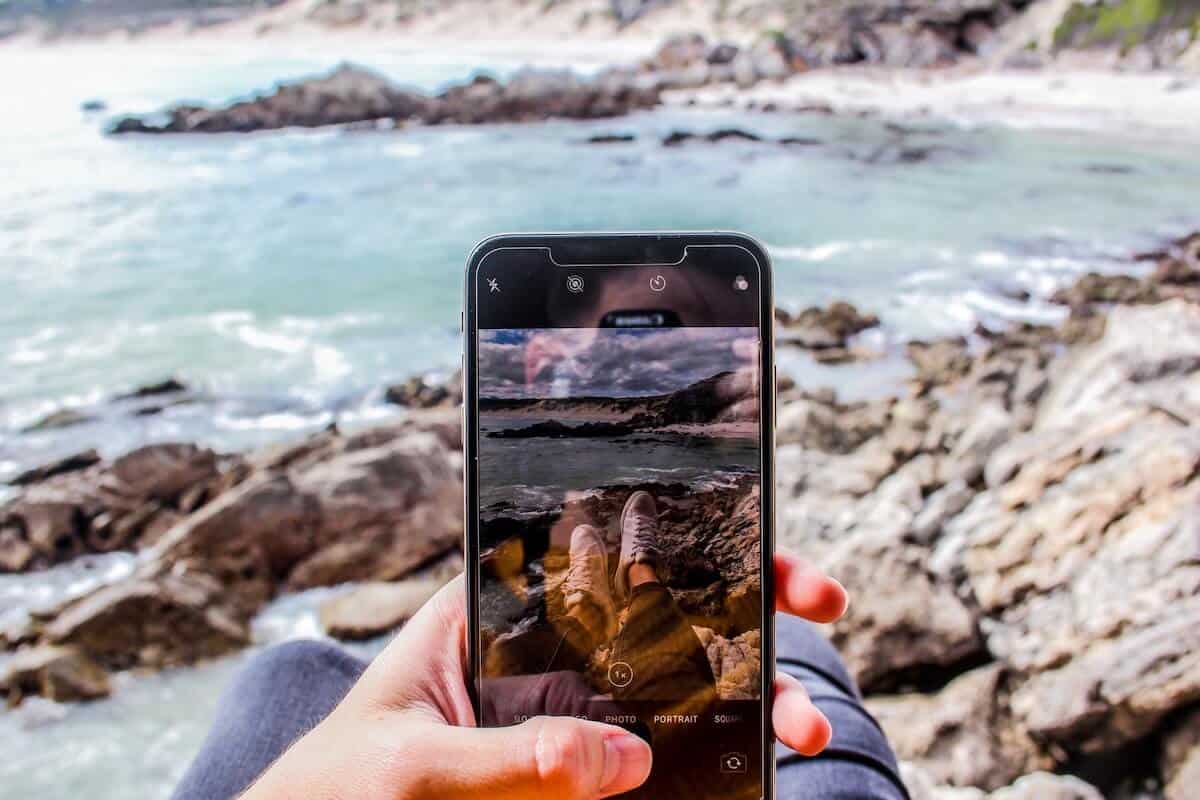
Table of Contents
- 1.1 The Happiest Hour
- 1.2 Wikicamps Australia
- 1.3 Beachsafe
- 1.4 The Outbound Collective
- 1.5 Dawn Patrol
- 1.6 Netflix
- 1.7 AllTrails
- 1.8 Free Wifi Finder
- 1.10 StarTracker
- 2.1 RoadTrippers
- 2.2 Spotify
- 2.5 Fuel Map Australia
- 2.6 Toilet Finder
- 3.1 Trail Wallet (IOS) or Travel Spend (IOS/Android)
- 3.2 XE Currency Converter
- 4.1 Whatsapp / Facebook Messenger
- 4.2 TripIt: Travel Planner
- 4.3 Uber / Ola
- 4.4 Google Translate
- 4.5 Packpoint
- 4.6 Sky Scanner
- 4.7 Travello
Must-Have Australia Travel Apps (Camping, Happy Hour, Flights etc)
The happiest hour.
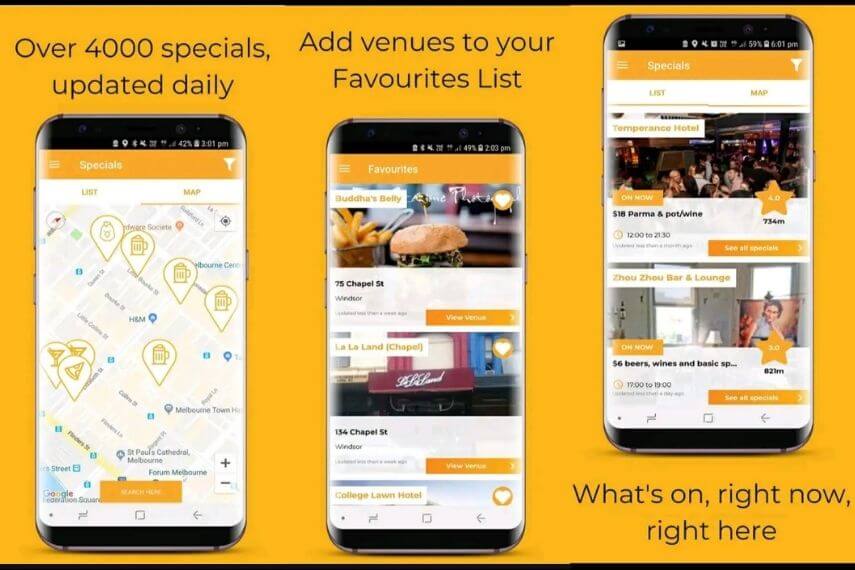
The app also helps users track down happy hour-related food deals, from pizza and pasta to dumplings and almost everything in between. Obviously, the bigger (and busier) the Australian city, the more options the app will display.
Available on both Google Play for Android devices and the App Store for iPhones .
Wikicamps Australia
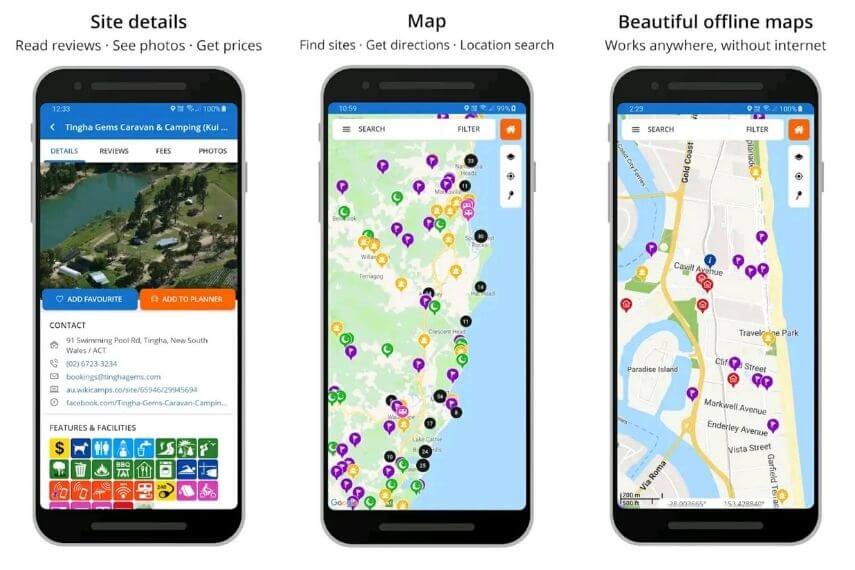
Kept up to date by users as they travel, it is an ever-growing resource packed with invaluable information – making it one of the Top Travel Apps in Australia. And with the offline map function, it’s the perfect app for finding all things camping (and road trip) related. Easily one of the most useful travel apps in Australia. Download it now (on Android or iPhone ) and start planning your next Aussie adventure.
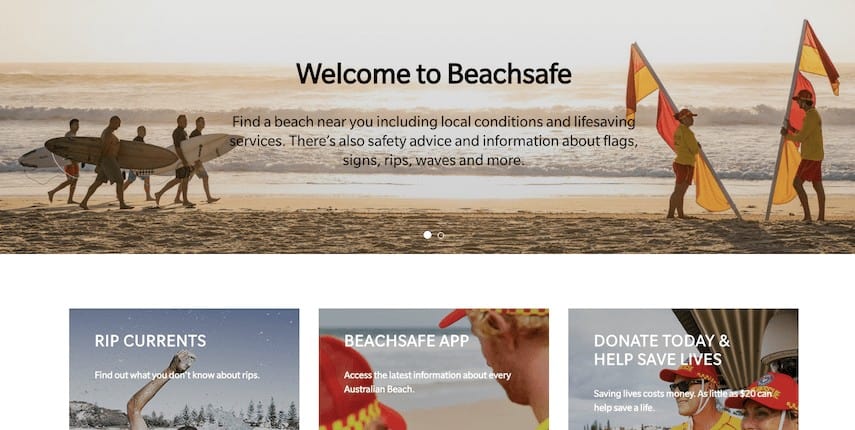
What you may not realise is that not Australian beaches are suitable for swimming and that’s where Beachsafe comes in. Brought to you by the Australian Surf Life Saving Association, you can search every beach for weather, hazards and water. Although they won’t always have information on dangerous rips, and so we recommend you swim at patrolled beaches between the distinctive red and yellow flags at all times.
Available in the Play Store & App Store – it is a must-have app for travelling in Australia.
The Outbound Collective
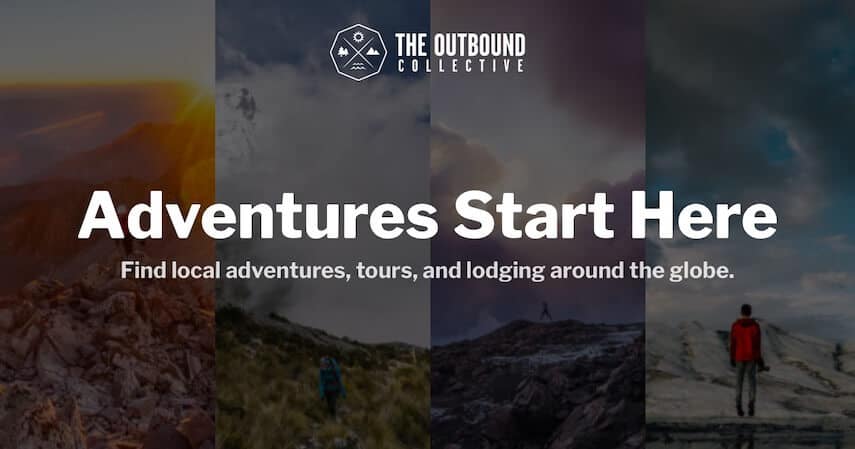
It’s the perfect inspirational app for exploring nature near to you when you’re not sure what you want to do or have landed in a new destination and are feeling a little uninspired. It’s one of the best free travel apps for exploring Australia and is available on iPhone and Android . (There’s also a tours and lodging tab – but we recommend sticking with just the local adventures. There are better apps for hotels & tours!)
Dawn Patrol
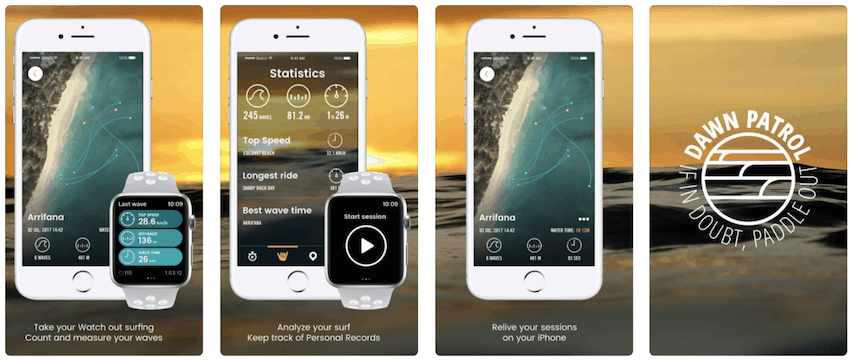
While the Dawn Patrol app (linked to your Apple Watch) is really not necessary when you’re trying to catch your first wave, for those who are at home on a board, it can be a great way to track each session in the water and records details about the break, how many waves you catch, how far you travel etc.

Although it’s not free, for a small monthly subscription you can have a range of TV and movies at your fingertips. Download a selection of movies and TV before you head off on your next adventure (using your home internet, rather than data!) – and stay entertained even when the Wifi is weak. (Available on both iPhone & Android)
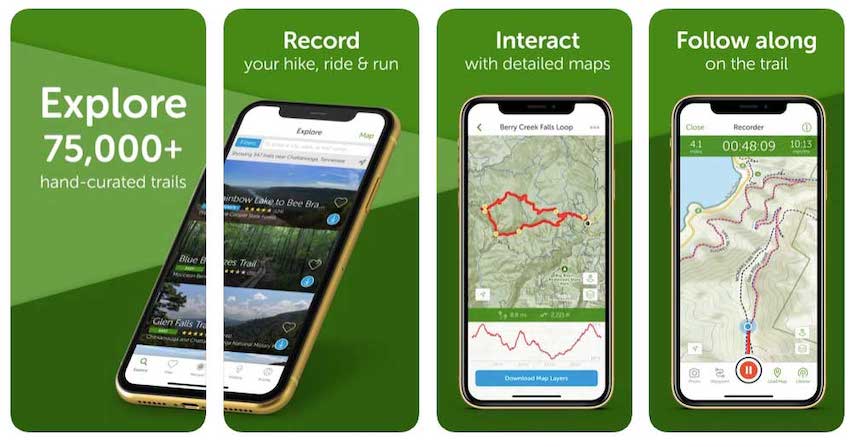
AllTrails have over 200,000 curated trail maps around the world – with over 7000 of them available for Australia.
Get inspired by local walking and biking trails and nature opportunities near you, and read user reviews and tips to find out what to know before you set off. The maps can be downloaded and used to track your adventures in real-time (if you don’t mind paying the annual fee), or can be used for free via mobile data while you’re out and about. You can even use the GPS on your phone to track your trails – which may help you retrace your steps if you get lost!
Free Wifi Finder

You can also use the tracking functions to monitor proposed routes and the app will send you a notification when it’s the perfect time to grab a bargain.
StarTracker

If you’re heading out into the country, the outback or just one of our incredible national parks, the StarTracker app is great fun for exploring the stars at night. Simply open the app, point your phone’s camera to the sky, and the app will tell you what you are looking at. Stars, planets, or constellations – it’s hours of fun.
(You can also point the phone at the ground and see what stars are on the other side of the world!) Get the App in the Playstore or AppStore .
Top Travel Apps for an Australian Road Trip
Roadtrippers.
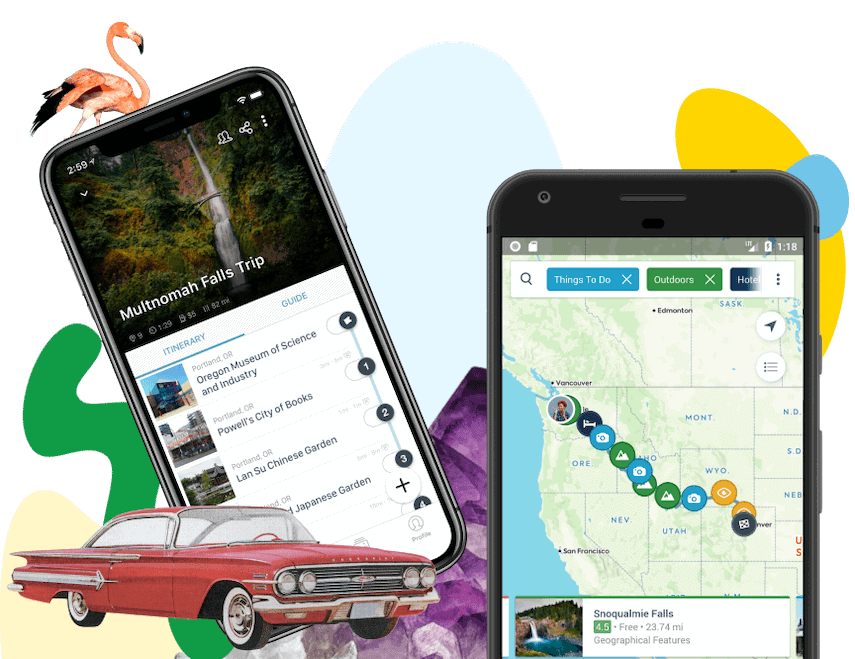
Plan your route, find attractions along the way, estimate driving times – RoadTrippers is a favourite road trip travel app has been the go-to app across the globe for putting together itineraries for years. Is invaluable when it comes to navigating the outback on our Aussie roads. Download the app here .

The real-time reporting of traffic accidents or simply, more traffic than normal, means the app gives you the quickest route, even after you have selected your destination. And if you have a trip scheduled for the next day, the app will alert you if there has been an unusual incident on your route and if you need to leave earlier.
The app also has a rideshare/carpool function, so even if you are not driving yourself, you can use the app to find others heading your way and share the fuel costs; or offer up a spare seat if you have one. You can download the app on iOS and Android here .
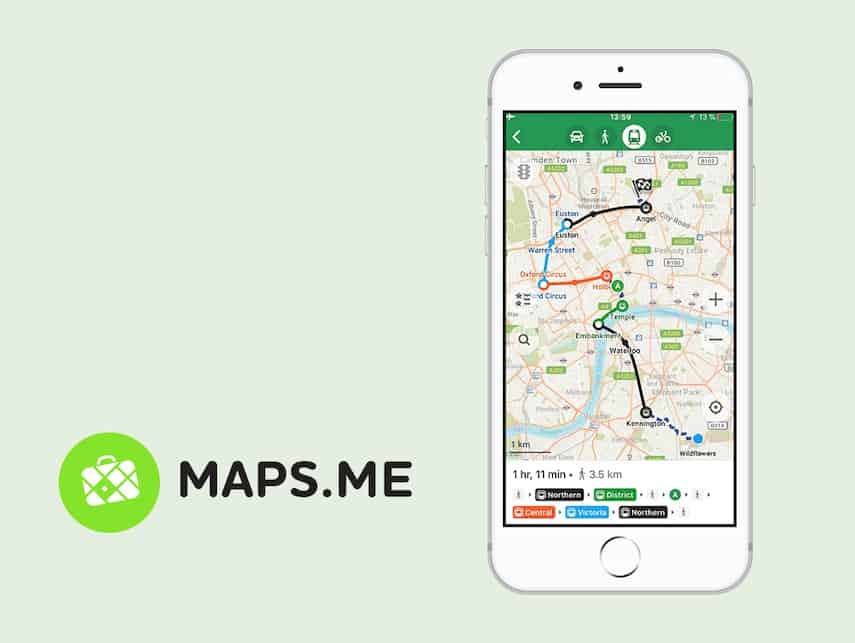
Pus, one of my favourite features – lots of viewpoints and points of interest built into the app that you can preview to decide if you want to stop along your way.
It’s one of the best free travel apps on the list. Download it on Google Play or the App Store .
Fuel Map Australia
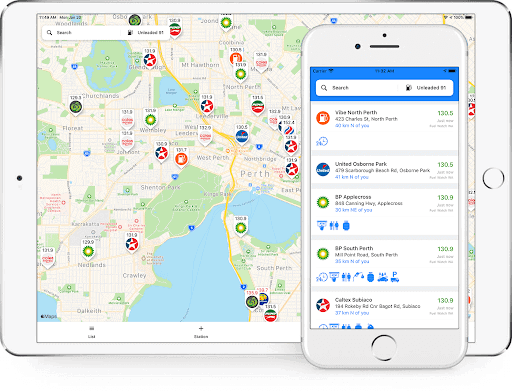
Toilet Finder
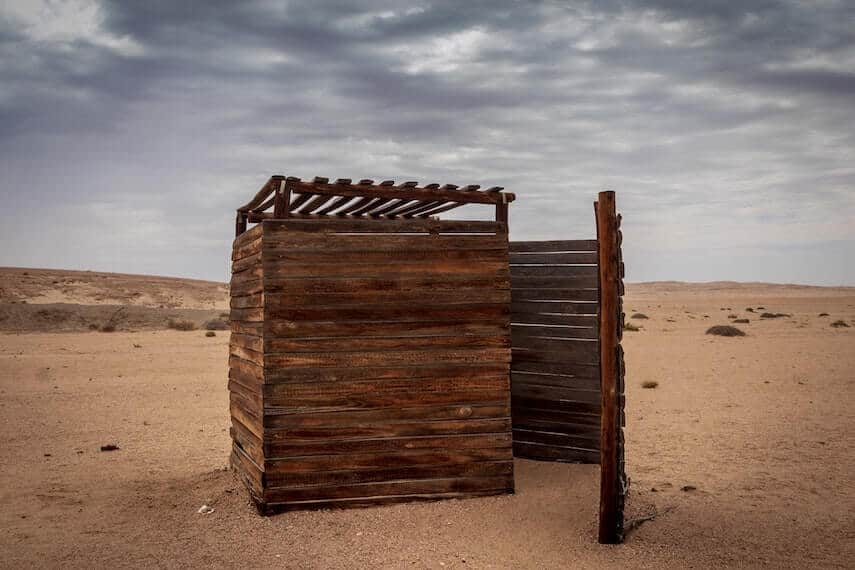

Free Travel Apps for Managing Your Money On the Road
Trail wallet (ios) or travel spend (ios/android).
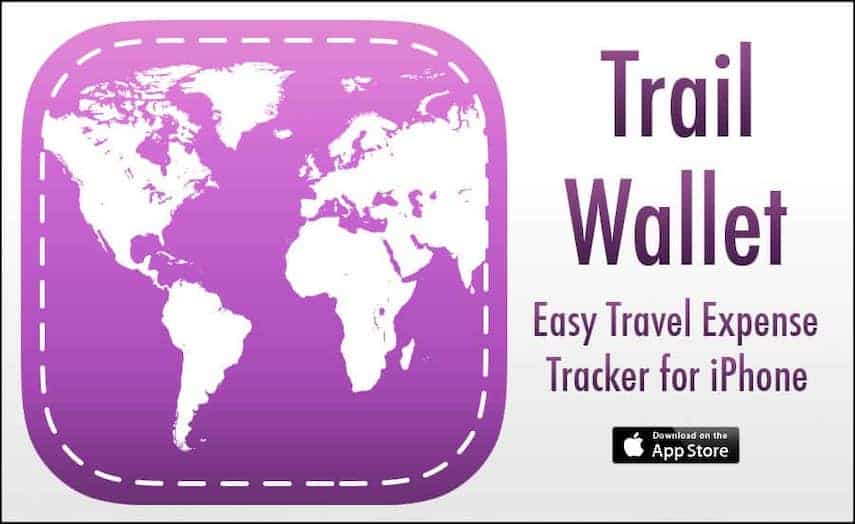
For those wanting something just for receipts, we recommend Smart Receipts. This is particularly good for grouping expenses into lists that work for you (destination, category etc)
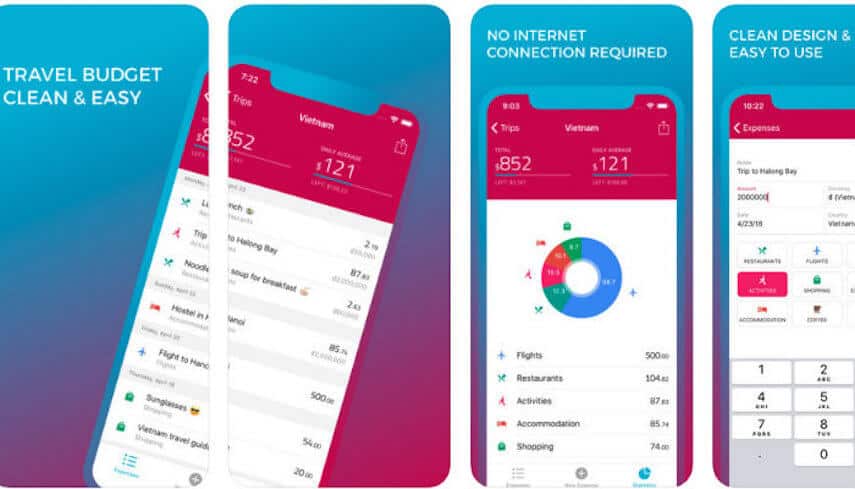
Travel Spend is similar to Trail Wallet in terms of spending tracking, adding expenses on the go and keeping track of your budget – and is the best alternative for those who are Android devotees.
XE Currency Converter
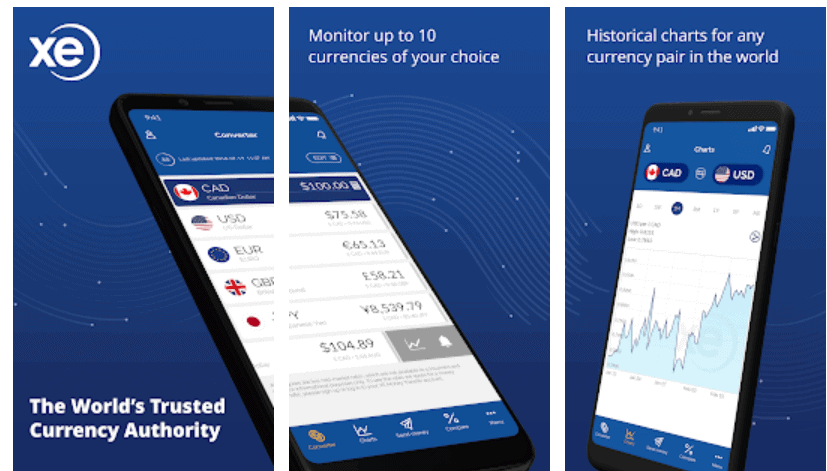
The exchange rates are live where you are connected to the internet – and where you are not, it uses the rate saved from the last time you opened the app. (Our top tip if you are relying on hotel wifi – open the app just before you leave your hotel for the day so your app exchange rates are never more than a few hours old.)
The XE Currency App also offers international money transfers, however for the best rates we recommend using Wise – whom you can also get a travel credit card for which lets you hold multiple currencies. This allows you to spend in whichever currency you like, and convert cash at the best rate at any given time.
The Best Travel Apps for Australia (and beyond!)
Whatsapp / facebook messenger.

TripIt: Travel Planner
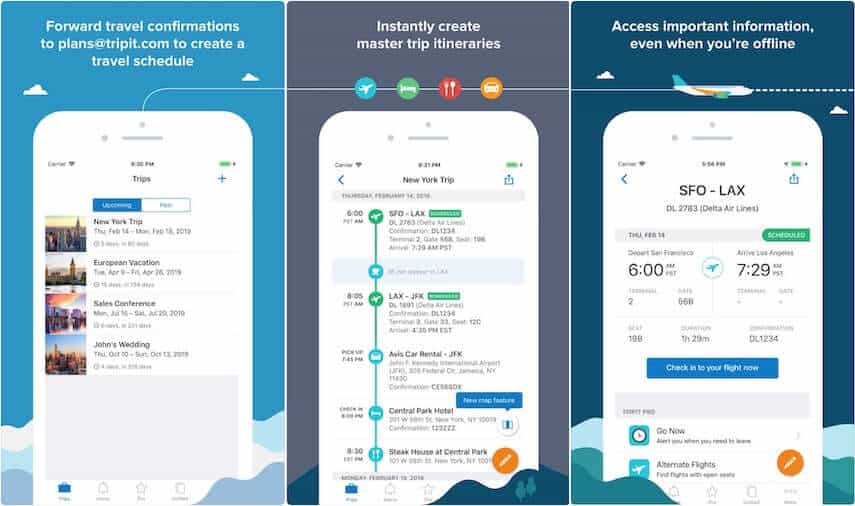
The app will group together and organise activities and tickets that fall within the date ranges of any return flights, and will track your travels as time passes. The app can also pull tickets out and log them automatically from your email when you link it to the app, and you can manually add them if it misses any.
For busy travel periods, this app is invaluable and as all your trips are stored in the app, can help you keep track of all your past adventures too.
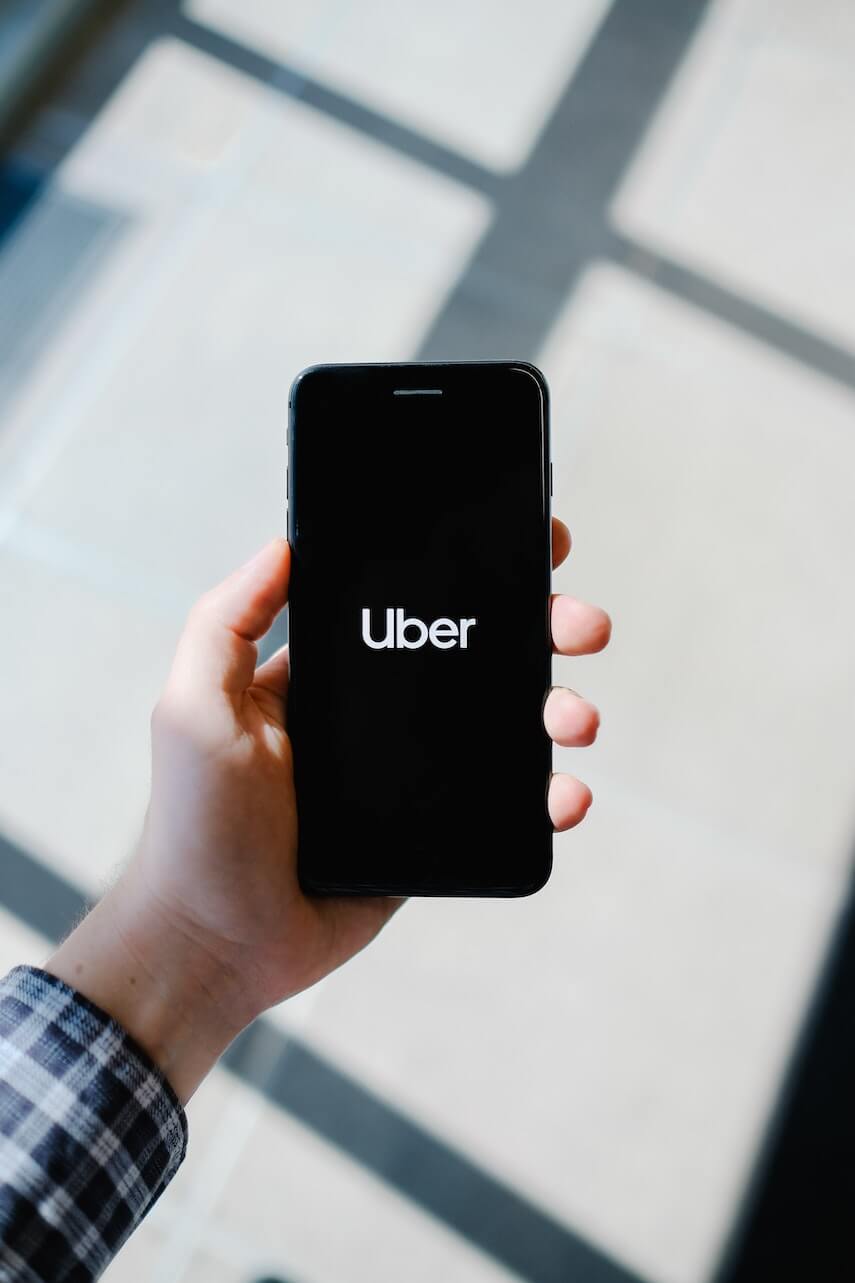
Wherever you are in Australia, it is of vital importance that everyone has the opportunity to get home safely, and rideshare apps such as Uber and Ola offer the ability for guests to track their drivers, their route and even share their current location with others.
We recommend having both downloaded and checking your fare on each before making a booking. Depending on surge charging at any given time, one app may be significantly cheaper than the other. (I also love that your Ola account earns you Velocity frequent flyer points, but I’m just a big points geek! )
Google Translate
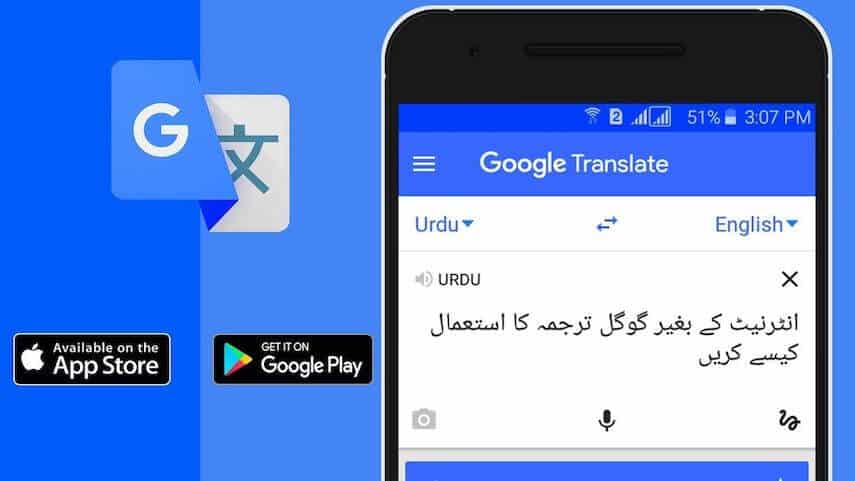
Sky Scanner
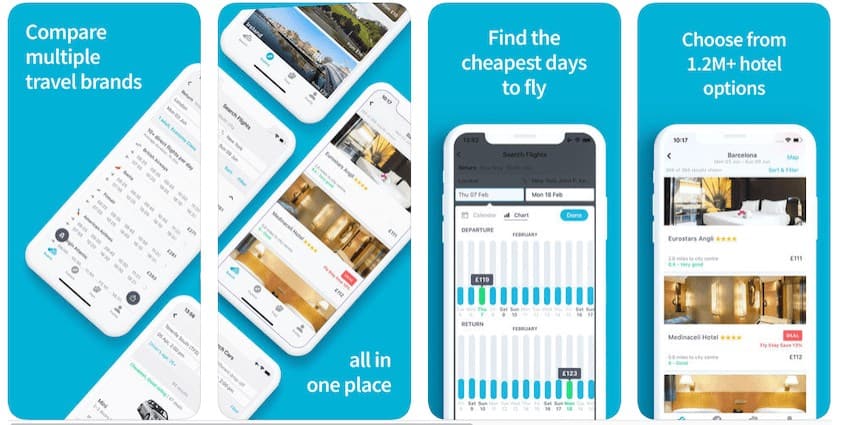
That’s a wrap, we hope our Australia travel guide to the best Australian Apps for Travel has shown you exactly what mobile apps will help when it comes to exploring Australia. And If you have planned your trip with an Australian travel app that isn’t on the list, be sure to let us know in the comments so we can add it!
Oh, if you liked this post please share on Facebook, tweet or pin – I’d really appreciate it! Click the P in the share bar for the full-size image!
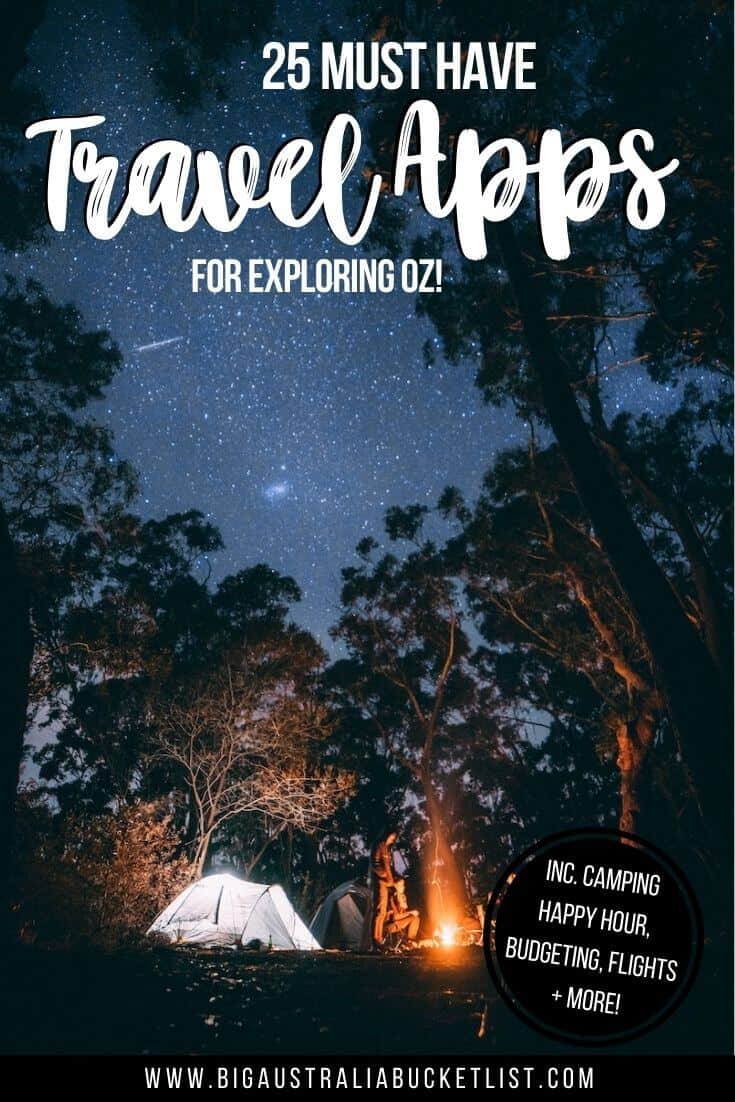
READY MORE TRAVEL INSPIRATION? YOU MIGHT BE INTERESTED IN THESE RECENT POSTS, TRAVEL ARTICLES, TRAVEL TIPS, DESTINATION GUIDES, TRAVELER RESOURCES, TRAVEL GEAR GUIDES AND RELATED POSTS ABOUT OTHER AMAZING PLACES AROUND AUSTRALIA:
- Test Your Aussie Knowledge: The Big Australia Trivia Quiz + Aussie Slang Dictionary + Australia Facts
- South Australia: Adelaide Travel Guide (Perfect for First Time Visitors)
- Australian Capital Territory: Top Things to do in the ACT
- Queensland: QLD Bucket List (inc. the some of the best spots on the East Coast Australia – think Gold Coast, Sunshine Coast, Airlie Beach, and the Great Barrier Reef) + 50 Top Things to do in Outback Queensland
- New South Wales: Top Things to do in Sydney, Best Places to visit in NSW (including the Opera House, Blue Mountains National Park)
- Victoria: The Ultimate Victoria Bucketlist (inc. the Great Ocean Road ), Melbourne Travel Guide (Perfect for First Timers) + Free Things to do in Melbourne , Melbourne Weekend Getaways & Best Time to Visit Melbourne (Month by Month Guide)
- General Australia Inspiration: 25 Best Places to Visit in Australia (inc. Alice Springs in the NT!)
- For International travel guides (North America, Europe, Middle East, Africa etc) head on over to MakeTimeToSeeTheWorld.com
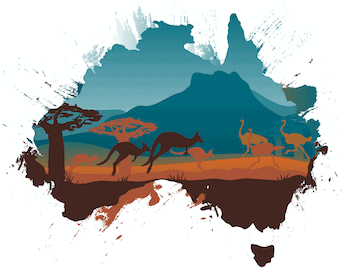
Hi There! Thanks for reading our guide to 25 BEST Australia Travel Apps / Generally The Best Travel Apps for Australia (and Beyond)! I just wanted to let you know that this post contains affiliate links, which means if you purchase something after clicking a link, I may get a small commission – which is at absolutely no cost to you . If you enjoyed this article and are going to be searching for some of the things I mention anyway, I would love it if you could click through from the links above & thank you in advance! Read my full Disclosure here .
- GetInspired
As an Amazon Associate, I earn from qualifying purchases: “Big Australia Bucket List are participants in the Amazon Services LLC Associates Program, an affiliate advertising program designed to provide a means for us to earn fees by linking to Amazon.com and affiliated sites”
We acknowledge the traditional owners of the country throughout Australia and their continuing connection to land, sea and community. We pay our respect to them and their cultures and to the elders past, present and emerging.
Copyright © 2020-2022 Big Australia Bucket List . All Rights Reserved

Search Smartraveller

Latest update
Exercise a high degree of caution in Indonesia overall due to security risks.
Higher levels apply in some areas.

Indonesia (PDF 699.19 KB)
Asia (PDF 2.21 MB)
Local emergency contacts
Fire services, ambulance and rescue services, medical emergencies.
Call 110 or 112.
Tourist Police, Bali
Call (+0361) 759 687.
Tourist Police, Jakarta
Call (+201) 526 4073.
Advice levels
Exercise a high degree of caution in Indonesia overall.
Reconsider your need to travel to the provinces of Papua (Papua), Papua Highlands (Papua Pegunungan), Central Papua (Papua Tengah) and South Papua (Papua Selatan).
Reconsider your need to travel to the provinces of Papua, Papua Pegunungan, Papua Tengah and Papua Selatan due to the risk of serious security incidents or demonstrations that may turn violent.
- There's an ongoing risk of terrorist attack in Indonesia. Be alert to possible threats. Take official warnings seriously and follow the advice of local authorities. Popular tourist areas may be the target of terrorist attacks.
- Public protests and events that draw large groups of people occur regularly and can turn violent with little notice. Expect traffic delays and restricted access to locations if there are protests. Avoid protests and demonstrations and monitor local media for the latest updates.
- Many of Indonesia's volcanoes are active and can erupt without warning. Adhere to exclusion zones around volcanoes, which can change at short notice, and follow the advice of local authorities. Domestic and international flights can be disrupted. Monitor Indonesia's Volcano Observatory Notice for the latest volcanic activity (Bahasa Indonesia and English), Global Disaster Alert and Coordination System and the Volcanic Ash Advisory Centre for updates.
- There's been tension, including demonstrations and violence, in certain towns in the provinces of Papua, Papua Pegunungan, Papua Tengah and Papua Selatan in recent years. Armed groups have stated that they're targeting foreigners, including Australians. Our ability to provide consular support in these provinces is limited. Armed groups have shot at aircraft, including commercial planes, in remote airports in Papua Pegunungan and Papua Tengah provinces.
- Petty and violent crime occurs in Indonesia. Opportunistic crime, such as pickpocketing occurs. Drinks may be spiked or mixed with toxic substances. Crimes involving taxis and taxi drivers occur. Solo women are at higher risk. Be alert in taxis, public transport, crowds, bars and nightclubs.
- Legal disputes over real estate are common, including in Bali. Before entering into an agreement or providing financial details, do your research and get legal advice.
- Natural disasters such as severe weather, floods, landslides, earthquakes, volcanic eruptions and tsunamis occur regularly. Weather conditions can change quickly during the wet season (October – April). Regularly check weather reports, monitor media and speak to your travel provider before continuing with planned activities. Follow the advice of local authorities.
- When undertaking adventure activities, ensure that functioning safety equipment is available, that you have travel insurance and that your policy covers you for these activities.
Full travel advice: Safety
- The standard of medical facilities in Indonesia is generally lower than in Australia. Many regional hospitals only provide basic facilities.
- Some medications, including prescription medications, drugs for attention deficit hyperactivity disorder (ADHD), all cannabis-based products including medicinal cannabis, cannabis-based oils and creams, hemp-based products, CBD, THC, hash and edibles, are illegal in Indonesia. Harsh penalties, such as arrest and jail time, can apply even if you have a prescription. Make sure your medication is legal in Indonesia .
- Purchasing prescription medication online or over the counter in Indonesia without an Indonesian prescription is illegal. Ensure you provide a valid prescription from an Indonesian doctor before purchasing prescription medication and confirm that it's accepted by the seller before your purchase.
Full travel advice: Health
- Indonesia has revised its criminal code, which includes penalties for cohabitation and sex outside of marriage. These revisions will not come into force until January 2026.
- Penalties for drug offences include heavy fines, long prison sentences and the death penalty. Police target tourist destinations.
- Some medications are illegal in Indonesia. Harsh penalties can apply even if you have a prescription. It is also illegal to purchase prescription medications online or over the counter without an Indonesian prescription. Ensure you have a valid Indonesian prescription. See ' Health '.
The death penalty exists for some crimes in Indonesia.
- Standards of dress and behaviour are conservative in many parts of Indonesia. Learn about local customs. Take care not to offend.
- Aceh province upholds aspects of sharia law. Sharia law applies to everyone, including travellers. Inform yourself about the laws, and be careful not to offend or break local laws. If in doubt, seek local advice.
Full travel advice: Local laws
- The Bali Provincial Government has introduced a new tourist levy of IDR 150,000 per person to foreign tourists entering Bali. The tourist levy is separate from the e-Visa on Arrival or the Visa on Arrival. Cashless payments can be made online prior to travel or on arrival at designated payment counters at Bali's airport and seaport. See the Bali Provincial Government's official website and FAQs for further information.
- If you're travelling to Indonesia for tourism, official government duties or business meetings, you can apply for an e-Visa on Arrival (e-VOA) online at least 48 hours before your travel to Indonesia. This also applies if you're transiting through Indonesia at international airports, seaports and land crossings. You can get a Visa on Arrival (VOA) at some international airports, seaports or land crossings.
- To apply for the e-VOA or VOA, you must have an ordinary (non-emergency) passport with at least 6 months of validity from the date you plan to enter (we also recommend having at least 6 months of passport validity from the date you plan to leave Indonesia, to avoid any issues for your departure or onward travel) and a return or onward flight booking to another country.
- You may need to apply for a visa in advance to enter Indonesia for purposes not covered by the e-VOA or VOA. Check the latest entry requirements with your travel provider or an Embassy or Consulate of Indonesia before travel. Entry, exit and transit conditions can change at short notice. Monitor media for the latest updates.
- You'll be required to complete an e-customs declaration for arrival. You can complete this within 3 days of departure to Indonesia.
- Travel requirements may change at short notice, including travel to Bali and Jakarta by air, land or sea. Contact your travel provider and monitor media for up-to-date details.
Full travel advice: Travel
Local contacts
- The Consular Services Charter tells you what the Australian Government can and can't do to help when you're overseas.
- For consular help, contact the Australian Embassy, Jakarta , the Australian Consulate-General, Bali , the Australian Consulate-General, Makassar or the Australian Consulate-General, Surabaya .
- To stay up to date with local information, follow the Embassy's social media accounts.
Full travel advice: Local contacts
Full advice
The terrorist threat in Indonesia is ongoing. Attacks could happen anywhere and anytime. This includes places that foreigners visit.
Be alert to possible threats. Take official warnings seriously and follow the advice of local authorities. Remain respectful of religious and local customs.
Indonesian authorities continue to investigate and disrupt terrorist groups in Indonesia, including Bali.
Terrorist attacks are motivated by extreme beliefs. Both local grievances as well as events in other parts of the world could motivate extremists in Indonesia towards violence.
Recent terrorist attacks
In December 2022, an explosion occurred at a police station in Bandung, Jawa Barat, killing 2 and injuring 11.
In March 2021, 2 suicide bombers attacked a church in Makassar, injuring dozens.
In the past, police have said that terrorist suspects remain at large and may seek Western targets.
Indonesian security agencies continue to conduct operations against terrorist groups.
Terrorists in Indonesia may carry out small-scale violent attacks with little or no warning.
Be alert in places of worship, especially during periods of religious significance.
Terrorists have targeted places of worship in:
As well as places of worship, other possible targets by terrorists include:
- Indonesian government facilities, premises and symbols associated with the Indonesian Government
- police stations and checkpoints
- bars, nightclubs, cafes and restaurants
- cinemas and theatres
- shopping centres, public transport and transport hubs
- airports and airlines
- clubs, including sporting clubs
- tourist areas and attractions, tour buses and tour groups
- outdoor recreation events
Supporters have committed additional acts of violence in response to high-profile extremists being detained or killed.
To protect yourself during a terrorist attack:
- leave the area as soon as it's safe
- follow the advice of local authorities
- don't gather in a group after an attack
- don't gather in a group if you're evacuated from a building
Security remains at a high level at:
- the Australian Embassy in Jakarta
- the Consulates-General in Bali, Makassar and Surabaya
More information:
Civil unrest and political tension
Most events are announced before they happen; however, protests may occur with little or no notice.
Protests and events are often held near major government buildings and embassies in Jakarta, including the Australian Embassy.
Protests may also occur at any of Australia's Consulates-General in Surabaya, Bali and Makassar, at government buildings, or the offices of international organisations in Indonesia.
You can expect traffic delays and restricted access to locations if there are protests.
Phone or email ahead for an appointment before going to the Embassy or the Consulates-General (see Local contacts ).
Demonstrations and acts of violence can happen when courts try and sentence extremists.
Conflict between different communities can sometimes occur, including in the provinces of Papua, Papua Pegunungan, Papua Tengah and Papua Selatan. Our ability to provide consular support in these provinces is limited.
Local violence can also be directed at minority groups in other parts of Indonesia, including in Java.
If you're found to endanger security or public order, you may be prosecuted under Indonesia's Immigration laws, which may result in imprisonment or deportation.
To protect yourself from possible violence:
- avoid protests and demonstrations
- monitor local media for the latest security updates
- plan your activities to avoid potential unrest on significant dates
- be prepared to change your travel plans
- Demonstrations and civil unrest
Armed conflict
The provinces of Papua, Papua Pegunungan, Papua Tengah and Papua Selatan experience regular violent clashes involving armed groups, civilians, Indonesian police, and the military. Armed groups have stated that they are targeting foreigners, including Australians. Our ability to provide consular support in these provinces is limited.
Many people have been killed and injured in clashes. This includes members of security forces, armed groups and civilians. Violent attacks have occurred in several areas of these provinces, including in and around Jayapura. There's a risk of more attacks.
On 23 February 2023, a riot broke out in Wamena, Papua Pegunungan, when a crowd attacked Indonesian security personnel following the arrest of two people accused of child kidnapping. 12 civilians and rioters were killed.
Violent attacks have occurred around the Freeport Mine in Papua Tengah.
Armed groups have:
- taken a New Zealand pilot hostage in Paro, Papua Pegunungan
- shot at aircraft, including commercial planes, at Beoga airport in Pupua Tengah province and Nop Goliat Dekai airport in Papua Pegunungan province.
- killed people in attacks, including one Australian
- attacked vehicles using the road between Grasberg and Timika
- killed people in violent attacks in Puncak Jaya District, Papua Tengah
- more attacks are possible and could target infrastructure and national institutions.
A range of crimes, including violent crime, occur in Indonesia. Crimes can happen in popular tourist locations in Bali.
To protect yourself from crime:
- be aware of your surroundings
- be alert in crowds
- understand the potential crime risks
Theft, robbery and bag and phone snatching have occurred. These crimes can sometimes involve violence. Opportunistic crime such as pickpocketing occurs.
Be careful of thieves:
- on motorcycles targeting pedestrians
- in upmarket shopping malls
- in crowded public transport
- at traffic lights targeting people in stopped cars
- at bars and nightclubs
- when entering accommodation, including villas in Bali
Keep bags and valuables out of sight in vehicles.
If you're travelling on foot, walk:
- on footpaths
- away from the curb
- with your bag held away from traffic
Sexual assault
If you're a victim of sexual assault :
- get immediate medical assistance. If you have any doubts about seeking medical assistance after a sexual assault, contact your nearest Australian Embassy or Consulate in Indonesia (see Local contacts ) as quickly as possible.
- make a full statement to local police, in person, so they can conduct a criminal investigation. You may wish to seek consular help before you visit the police station. Contact your nearest Australian Embassy or Consulate (see Local contacts ).
Local police can only investigate a crime after you've left Indonesia if you've reported it.
Your sworn statement, or statements by witnesses, can be used as evidence in criminal court proceedings.
You don't always need to be in Indonesia for trial. Neither do witnesses who live outside of Indonesia.
Counselling support
Should you wish to speak to a counsellor, you can call the 24-hour Consular Emergency Centre on +61 2 6261 3305 or contact your nearest Australian Embassy or Consulate (see Local contacts ). They can connect you to counselling hotlines and services.
- Reducing the risk of sexual assault
Bars and nightclubs
Be alert in bars and nightclubs. Drink-spiking and snatching of valuables may occur if you're not alert.
Drinks may be contaminated with drugs or toxic substances. See Health .
Don't leave your food or drinks unattended.
Never accept drinks, food, gum, cigarettes, vapes or e-cigarettes from people you've just met.
- Partying safely
Credit card and ATM fraud
Credit card, online banking and ATM fraud occurs in Indonesia.
Check your bank statements.
Make sure your bank doesn't block your cards. Tell your bank you'll be visiting Indonesia.
Never let your card out of your sight. This includes when you pay in restaurants.
Shield your PIN from sight.
Some vendors install hidden cameras and use card skimmers.
Don’t click on unknown links in WhatsApp or mobile phone text messages, particularly if your phone is linked to mobile banking.
Use ATMs at controlled and secure places, such as:
- shopping centres
Scams and confidence tricks
Beware of scams and confidence tricks.
Only exchange money at authorised money changers. Authorised money changers can also be found on the Bali Foreign Exchange website . Unauthorised money changers have been known to scam foreign tourists in Bali and elsewhere.
All types of gambling are illegal in Indonesia.
Australians have lost large sums of money in card game scams run by organised gambling gangs, particularly in Bali. See Local laws
Some tourists have been robbed or planted with drugs after taking new acquaintances back to their hotel rooms. In some cases, their drinks were spiked.
Legal disputes over the purchase of real estate are common, including in Bali, involving:
- holiday clubs and resorts
- timeshare schemes
Before entering into an agreement or providing financial details:
- thoroughly research the proposal
- get legal advice and know your rights, especially before you sign any documents
Using taxis
Only use licensed official metered taxis. Crimes involving unregistered taxis include:
- taxis departing before the passenger can take their baggage from the vehicle
- taxi drivers robbing or temporarily holding passengers, including in urban areas
- taxi drivers forcing passengers to withdraw money at ATMs before releasing them
Lone female travellers are at higher risk of crime.
If you're in an incident involving a taxi, leave the taxi and the immediate area if it's safe to do so.
To protect yourself from overcharging and scams:
- only travel in licensed taxis with signage, a "taxi" roof sign and meters working
- ensure the driver's identification card is visible
- book via your phone, on an official taxi company mobile app, from inside an airport, or at stands at major hotels
See Travel .
Cyber security
You may be at risk of cyber-based threats during overseas travel to any country. Digital identity theft is a growing concern. Your devices and personal data can be compromised, especially if you're connecting to Wi-Fi, using or connecting to shared or public computers, or to Bluetooth.
Social media can also be risky in destinations where there are social or political tensions, or laws that may seem unreasonable by Australian standards. Travellers have been arrested for things they have said on social media. Don't comment on local or political events on your social media.
- Cyber security when travelling overseas
Kidnapping occurs across the world with political, ideological and criminal motives. Foreigners, including Australians, have been kidnapped overseas while travelling. Kidnaps can happen anywhere, anytime, including destinations that are typically at lower risk.
On 7 February 2023, a New Zealand pilot was taken hostage by an armed group in Paro, Papua Pegunungan.
The Australian Government's longstanding policy is that it doesn't make payments or concessions to kidnappers.
Adventure activities
Many businesses don't follow safety and maintenance standards. This includes transport and tour operators, water sports providers, hotels, restaurants and shops.
It may affect adventure activities, such as:
- bungee jumping
- scuba diving and snorkelling
- chairlift or gondola rides
In the past, Australians have been seriously injured or died while participating in adventure activities. If you require intensive care medical treatment, emergency surgery or medical evacuation. The Australian Government won't pay for these costs.
If you plan to do an adventure activity :
- check if your travel insurance policy covers it
- ask about safety, search and rescue procedures
- ask about and insist on minimum safety requirements
- always use available safety gear, such as life jackets or seatbelts
- check with your travel provider on vessel capacity limits before embarking on sea, land or air travel
- check weather and ocean conditions, and whether the vessel has had any mechanical issues, on the day and before continuing with water activities or sea travel
- check where the nearest medical facilities are
If proper safety equipment isn't available or you're unsure of the provider's safety or maintenance procedures, use another provider.
Trekking and climbing
Some mountain treks suit only experienced climbers. Travel with a guide and check the level of difficulty beforehand.
Many trekking options may be on or around an active volcano. Many of Indonesia's volcanoes are active and can erupt without warning. Volcanic and seismic activity may continue for some time. Adhere to exclusion zones around volcanoes, which can change at short notice, and follow the advice of local authorities. If you're planning to travel to an area near an active volcano, check with local authorities before climbing and check:
- Bureau of Meteorology Volcanic Ash Advisory Centre
- MAGMA Indonesia (Bahasa Indonesia) for daily updates on status and alert levels
- National Disaster Management Authority (BNPB) (Bahasa Indonesia)
- Global Disaster Alert and Coordination System
Swimming safety
People have drowned in coastal areas, including in Bali, due to rough seas, strong currents, or from swimming, snorkelling or scuba diving in areas where there is frequent passage of boats, resulting in collisions.
Local beach rescue services may not be of the same standard as in Australia.
Saltwater crocodiles are in rivers throughout Indonesia. Avoid swimming around river estuaries and seek local advice in other locations.
If you plan to spend time in or on the water:
- regularly check weather reports as sea conditions can change rapidly
- take warnings seriously
- check media and local sources for information about potential dangers
- speak to your travel provider about safety equipment and weather conditions before continuing with planned activities
- take a friend or family member with you when you undertake swimming or water activities
- be careful when swimming, snorkelling or scuba diving near motor-powered boats or where there is frequent passage of boats
- ensure you have travel insurance and that your policy covers you for planned activities
Ensure you have travel insurance and that your policy covers you for planned activities.
Climate and natural disasters
Indonesia experiences natural disasters and severe weather , including:
- landslides and mudslides
- volcanic eruptions
- earthquakes
- storms resulting in turbulent sea conditions
- tsunamis and high wave events
If there's a natural disaster or severe weather:
- always carry your passport in a waterproof bag
- keep in contact with family and friends
- check the media and local sources for information
- don't undertake sea, land or air travel if it's not safe to do so
- Indonesian Meteorology, Climatology and Geophysics Agency (BMKG) (English and Bahasa Indonesia)
- BMKG Multi-Hazard Early Warning System app (English and Bahasa Indonesia)
Floods and mudslides
Floods , landslides and mudslides occur regularly during the wet season from October to April, with some severe events resulting in injury, displacement, death or damaged infrastructure.
Heavy rains can cause significant flooding in urban areas, including the greater Jakarta region, causing disruption to transportation. Monitor the local media for updates.
Walking and driving in flooded areas can be dangerous. Flood waters may hide uncovered drainage ditches.
Volcanic activity may escalate with little or no notice, leading to flight disruptions and airport closures, including in surrounding provinces. Contact your airline for the latest flight information.
There are 147 volcanoes in Indonesia. 76 of them are active volcanoes and could erupt at any time.
Volcanic alert levels and exclusion zones may rise quickly. You may be ordered to evacuate at short notice. Volcanic activity can disrupt domestic and international flights. There are 4 volcano alert levels in Indonesia; 1 - normal, 2 - advisory, 3 - watch, 4 - warning.
Before you travel to areas that are prone to volcanic activity, monitor media and ensure you read the Indonesian Government's latest advice on current volcanic activity, including:
- Volcanic Activity Report by Indonesia's Multiplatform Application for Geohazard Mitigation and Assessment (MAGMA) (Bahasa Indonesia)
- Volcano Activity and Observatory Notices (English and Bahasa Indonesia)
- MAGMA Indonesia Map of Latest Volcano Levels and Climate Information (Bahasa Indonesia)
- Bureau of Meteorology's Volcanic Ash Advisory Centre
If there's volcanic activity:
- avoid the area
- take official warnings seriously and adhere to exclusion zones
- follow the instructions and advice of local authorities
- follow evacuation orders
- read our advice on Volcanic eruptions while travelling
Volcanic ash can cause breathing difficulties. The risk is higher for people with chronic respiratory illnesses, including:
Recent and frequent volcanic activity has included:
- Mount Ile Lewetolok in East Nusa Tenggara (Nusa Tenggara Timur)
- Mount Lewotobi Laki Laki in East Flores Regency, Nusa Tenggara Timur
- Mount Marapi in West Sumatra
- Mount Anak Krakatau, to the south of Sumatra
- Mount Merapi, near Yogyakarta
- Mt Dukono in North Sulawesi
- Mount Semeru, near Malang, East Java
- Mount Agung in Bali
- Mount Sinabung in North Sumatra
Some trekking routes are on or near active volcanoes, including Mount Agung and Mount Batur in Bali, Mount Marapi in West Sumatra, Mount Merapi near Yogyakarta, Mount Rinjani in Lombok, Mount Bromo and Mount Ijen in East Java. See 'Trekking and climbing'.
If you're planning to travel to an area near an active volcano, make sure you have comprehensive travel insurance and check if any restrictions apply.
If a volcanic eruption occurs:
- make a backup plan in case you're affected
- contact your airline or travel insurer to confirm flight schedules and get help
- keep in touch with family and friends
- Learn more about volcanic eruptions (Geoscience Australia)
- See practical advice and information about volcanic eruptions (US CDC)
- See worldwide volcanic activity reports in real-time (GDACS)
Earthquakes
Indonesia is in an active earthquake region. It has a high level of earthquake activity, that sometimes triggers tsunamis.
There are approximately 4,000 earthquakes across Indonesia every year. Around 70 to 100 of these are over 5.5 magnitude.
Earthquakes can cause death, injury and significant damage to infrastructure.
Strong earthquakes can occur anywhere in Indonesia. They are less common in Kalimantan and south-west Sulawesi.
To stay safe during an earthquake:
- know the emergency plans at your accommodation
- take precautions to avoid exposure to debris and hazardous materials, including asbestos
- MAGMA Indonesia (Bahasa Indonesia)
- Indonesia's Meteorology, Climatology and Geophysics Agency (Bahasa Indonesia) or BMKG Multi-Hazard Early Warning System app (English and Indonesia)
- Indonesia's Centre for Volcanology and Geological Disaster Mitigation (Bahasa Indonesia)
- US Federal Emergency Management Agency advice on what to do before, during and after an earthquake (English)
Forest fires and smoke haze
During the dry season in April to November, widespread forest fires can cause smoke haze resulting in poor air quality across parts of Indonesia, particularly the Riau Islands, central Sumatra and Kalimantan.
Smoke haze could affect your health and travel plans.
Keep up to date with local information and seek medical advice on appropriate precautions.
- ASEAN Regional Haze Situation
- Smartraveller advice on Bushfires
Tsunamis and high wave events
The Indian and Pacific Oceans experience more frequent, large and destructive tsunamis than other parts of the world.
There are many large earthquakes along major tectonic plate boundaries and ocean trenches.
High wave events can happen throughout coastal regions and between islands. They're caused by strong weather conditions and storms.
If you plan to surf, undertake water activities or travel by sea, check local conditions regularly.
If there’s a tsunami or high wave event:
- don't travel by sea if it's not safe to do so
- Indonesia Tsunami Early Warning Centre issues warnings when a potential tsunami with significant impact is expected
- Indonesia's Meteorology, Climatology and Geophysics Agency with the latest list of earthquakes with a magnitude greater than 5.0 on the Richter scale (Bahasa Indonesia) or BMKG Multi-Hazard Early Warning System app (English and Bahasa Indonesia)
- US Federal Emergency Management Agency page on what to do before, during and after an earthquake
Piracy occurs in the coastal areas of Indonesia.
The International Maritime Bureau (IMB) issues weekly piracy reports.
If you decide to travel by boat in these regions:
- check IMB piracy reports
- get local advice
- arrange security measures
- Travelling by boat
- Going on a cruise
- International Maritime Bureau
Travel insurance
Get comprehensive travel insurance before you leave.
Your policy needs to cover all overseas medical costs, including emergency treatment and medical evacuation. The Australian Government won't pay for these costs.
If you can't afford travel insurance, you can't afford to travel. This applies to everyone, no matter how healthy and fit you are.
If you're not insured, you may have to pay many thousands of dollars up-front for medical care.
Before you travel, confirm:
- what activities and care your policy covers
- that your insurance covers you for the whole time you'll be away, including on all forms of transport you plan to take
- whether it covers medical evacuation in the event of hospitalisation or injury
- any exclusions to your policy
Physical and mental health
Consider your physical and mental health before you travel, especially if you have an existing medical condition.
See your doctor or travel clinic to:
- have a basic health check-up
- ask if your travel plans may affect your health
- plan any vaccinations you need
Do this at least 8 weeks before you leave.
If you have immediate concerns for your welfare or the welfare of another Australian, call the 24-hour Consular Emergency Centre on +61 2 6261 3305 or contact your nearest Australian Embassy, High Commission or Consulate to discuss counselling hotlines and services available in your location.
- General health advice
- Healthy holiday tips (Healthdirect Australia)
Not all medication available over the counter or by prescription in Australia is available in other countries. Some may even be considered illegal or a controlled substance, even if prescribed by an Australian doctor.
Some drugs used to treat attention deficit hyperactivity disorder (ADHD) are illegal in Indonesia.
If you plan to bring over-the-counter or prescription medication, check if it's legal in Indonesia by contacting the Indonesian Embassy in Canberra well in advance of your planned travel. Take enough legal medicine for your trip and carry it in its original packaging. Purchasing prescription medication online in Indonesia without an Indonesian prescription is illegal. Ensure you provide a valid prescription from an Indonesian doctor before purchasing prescription medication and confirm that it's accepted by the seller prior to your purchase.
Carry a copy of your prescription and a letter from your doctor stating:
- what the medicine is
- your required dosage
- that it's for medical treatment or use
If you're caught with illegal medicine, you could face detention, fines or harsher penalties. You could face charges even if an Australian doctor prescribed the medication.
Ask the Indonesian Embassy in Canberra for advice before you travel.
Medicinal cannabis and cannabis-based products
Cannabis-based products such as cannabis oil and creams, hemp, CBD, THC, hash and edibles remain illegal in Indonesia, including for medicinal purposes. A medical prescription does not make it legal. If you take such products to Indonesia or purchase or use them in Indonesia, you can be arrested and face imprisonment, fines, deportation or the death penalty.
- Medications
Health Risks
Critical care for Australians who become seriously ill, including in Bali, is significantly below the standard available in Australia. Medical evacuation may not be possible.
The Australian Government cannot guarantee your access to hospitals and other health services in Indonesia.
Medical evacuation to Australia for medical conditions, is possible but is very expensive and may not be covered by travel insurance. Check your policy before you travel.
Ban on sale of liquid/syrup medication
The Indonesian Ministry of Health (MoH) has advised local health workers and pharmacists to stop selling liquid/syrup medication, including commonly used medications containing paracetamol and cough syrups. MoH and the Indonesian Paediatrician Association (IDAI) received reports of a sharp increase in cases of Atypical Progressive Acute Kidney Injury (AKI) in children , especially under the age of 5 years.
Insect-borne illnesses
Insect-borne illnesses are common throughout the year.
To protect yourself from disease:
- research your destination
- ask locals for advice
- make sure your accommodation is mosquito-proof
- use insect repellent
- wear long, loose, light-coloured clothing
Dengue occurs throughout Indonesia, including Bali, Jakarta and other major cities.
Dengue is common during the rainy season.
Australian health authorities have reported an increase in dengue infections in people returning from Bali in recent years.
Consult your travel doctor for further information on available vaccines and their suitability for your individual circumstances.
Zika virus can occur in Indonesia.
Protect yourself from mosquito bites.
The Australian Department of Health and Aged Care advises pregnant women to:
- discuss any travel plans with their doctor
- consider deferring non-essential travel to affected areas
Malaria , including chloroquine-resistant strains, is widespread in rural areas, particularly in the provinces of Papua, Papua Pegunungan, Papua Tengah, Papua Selatan, Papua Barat Daya, Papua Barat, Maluku and Nusa Tenggara Timur. There is no malaria transmission in Jakarta.
- Consider taking medicine to prevent malaria.
Japanese encephalitis and filariasis
Japanese encephalitis and filariasis occur in Indonesia, especially in rural agricultural areas.
Japanese encephalitis has been present in Australian travellers returning from Indonesia, including Bali.
Vaccination is recommended for certain groups of travellers.
- Infectious diseases
Drink poisoning
People have been poisoned by alcoholic drinks contaminated with harmful substances, including methanol and arak (a traditional rice-based spirit). Locals and foreigners, including Australians, have died or become seriously ill from poisoned drinks.
Cases of drink poisoning have been reported in Bali and Lombok.
Contaminated drinks have included:
- local spirits
- spirit-based drinks, such as cocktails
- brand name alcohol
To protect yourself from drink poisoning:
- consider the risks when drinking alcoholic beverages
- be careful drinking cocktails and drinks made with spirits
- drink only at reputable licensed premises
- avoid home-made alcoholic drinks
Labels on bottles aren't always accurate.
Symptoms of methanol poisoning can be similar to drinking too much. However, they are usually stronger.
Symptoms of methanol poisoning include:
- vision problems
Vision problems may include:
- blindness, blurred or snowfield vision
- changes in colour perception
- difficulty looking at bright lights
- dilated pupils
- flashes of light
- tunnel vision
If you suspect that you or someone you're travelling with may have been poisoned, act quickly. Urgent medical attention could save your life or save you from permanent disability.
Report suspected cases of methanol poisoning to the Indonesian police.
Magic mushrooms
Don't consume magic mushrooms. They're illegal.
Australians have become sick or injured after taking magic mushrooms.
Australians have been in trouble with local police after taking magic mushrooms, particularly in Bali.
Magic mushrooms can cause major health problems, including:
- erratic behaviour
- severe hallucinations
Rabies is a risk throughout Indonesia, especially in:
- Nusa Tenggara Timur, including Labuan Bajo
- South Sulawesi
- West Kalimantan
- Nias, off the west coast of Sumatra
To protect yourself from rabies:
- avoid direct contact with dogs
- don't feed or pat animals
- avoid contact with other animals, including bats and monkeys.
Talk to your doctor about getting a pre-exposure rabies vaccination.
If bitten or scratched by an animal:
- immediately use soap and water to wash the wound thoroughly for 15 minutes
- seek urgent medical attention.
Rabies treatment in Indonesia may be limited, including the rabies vaccine and immunoglobulin availability. If you're bitten, you may need to return to Australia or travel to another country for immediate treatment.
You're at risk of contracting rabies if you visit a market where live animals and fresh food are sold because:
- live rabies-positive dogs may be present
- rabies-positive dog meat may be sold as food
Selling dog meat for human consumption is a breach of government disease control regulations.
Avoid contact with monkeys, even in places where you're encouraged to interact with them. This includes:
- popular markets
- tourist destinations
- sanctuaries
Legionnaires' disease
Cases of Legionnaires' disease have been reported in people who have travelled to Bali. Travellers who are unwell with flu-like symptoms within 10 days of returning from Bali are advised to consult their GPs.
- Legionnaires' disease warning for Bali travellers (Western Australian Government Department of Health)
- Legionnaires’ disease (Better Health Channel, Victorian Government Department of Health)
- Legionnaires' disease (World Health Organization)
Cases of poliovirus (type 1) have been reported in the provinces of Papua, Papua Pegunungan, Papua Tengah and Papua Selatan. Poliovirus (type 2) cases have been reported in the provinces of Aceh, East, West and Central Java. There may be unreported cases in other provinces in Indonesia.
Ensure that you're vaccinated against polio.
- Factsheet on poliovirus types (World Health Organization)
- Health emergencies information for Indonesia (World Health Organization)
Periodic outbreaks of measles continue to be reported in Indonesia, including Bali.
You need 2 doses of vaccine 4 weeks apart to be fully vaccinated against measles.
If you have symptoms of measles, seek medical attention.
Measles is highly infectious. Call before attending a healthcare facility.
Nipah Virus and Yellow Fever
There are no cases of Nipah virus or Yellow Fever in Indonesia. You may be temperature checked on arrival at international and domestic airports. If you have fever symptoms, you may be referred to the airport clinic for further tests and asked to seek medical treatment. See your doctor or travel clinic before you travel to plan any vaccinations you need.
HIV/AIDS is a risk for travellers. Take steps to reduce your risk of exposure to the virus.
Other health risks
Waterborne, foodborne, parasitic and other infectious diseases are widespread. These include:
- tuberculosis
Serious outbreaks sometimes occur.
To protect yourself from illness:
- boil drinking water or drink bottled water
- avoid ice cubes
- avoid raw food, such as salads
To minimise the risk of food poisoning, only eat meat from reputable suppliers.
Seek urgent medical attention if you suspect food poisoning or have a fever or diarrhoea.
Seafood toxins
You can become sick from naturally occurring seafood toxins, including:
- ciguatera fish poisoning
- scombroid (histamine fish poisoning)
- toxins in shellfish
Avoid temporary black henna tattoos. The dye often causes serious skin reactions.
Before you get any tattoo, check the hygiene and safety of your tattoo provider.
Medical care
Medical facilities.
The standard of medical facilities in Indonesia is generally lower than Australia. Many regional hospitals only provide basic facilities.
Hospitals expect families to provide support to patients, including all financial support.
Psychiatric and psychological services are limited in Indonesia. Hospital staff may use physical restraints on patients.
When diving in Indonesia, there is a risk that you may experience decompression illness. An illness may occur when a diver ascends to the water surface too quickly and may have severe consequences. Understand the risks before you dive.
Decompression chambers are available in various areas, including the following locations:
- Bali's Sanglah General Hospital
- Siloam Hospital in Labuan Bajo
- Hospitals in Jakarta, Balikpapan, Bintan, Medan, Makassar, Raja Ampat (Waisai), Maluku, Tual and Manado near popular dive sites
Before admitting patients, hospitals usually need:
- guarantee of payment from the patient or their next of kin (family or friend)
- confirmation of medical insurance
- deposit payment
There's no reciprocal healthcare agreement between Australia and Indonesia.
The Australian Government cannot provide guarantee of payment, confirmation of medical insurance or a deposit payment for services.
If you become seriously ill or injured, you may need to be evacuated to a place with better care. Medical evacuation can be very expensive. Check your insurance policy before you travel. The Australian Government won't pay for these costs. It's best to check with your travel provider on the location and functionality of decompression chambers and other medical facilities available in the area before undertaking remote travel.
You're subject to all local laws and penalties, including those that may appear harsh by Australian standards. Research local laws before travelling.
Indonesian Parliament has passed revisions to its criminal code, which includes penalties for cohabitation and sex outside of marriage. These revisions will not come into force until January 2026.
Indonesia has signed into law revisions to the Electronic and Information Transactions Law (ITE Law). Tough penalties apply for defamation, hate speech, spreading hoaxes and uploading immoral content to the Internet. The law applies both within and outside Indonesia.
If you're arrested or jailed, the Australian Government will do what it can to help you under our Consular Services Charter . But we can't get you out of trouble or out of jail.
- Arrested or jailed
Penalties for drug offences are severe. They include the death penalty.
You may face heavy fines or jail for consuming or possessing even small amounts of drugs, including marijuana. Cannabis-based products such as cannabis oil and cream, hemp, CBD, THC, hash and edibles remain illegal in Indonesia, including for medicinal purposes. A medical prescription does not make it legal. If you take such products to Indonesia or purchase or use them in Indonesia, you can be arrested and face imprisonment, fines, deportation or the death penalty.
Some prescription medications that are available in Australia are illegal in Indonesia. Purchasing prescription medication online or over the counter in Indonesia without an Indonesian prescription is illegal. Ensure you provide a valid prescription from an Indonesian doctor before purchasing prescription medication and confirm that it's accepted by the seller before your purchase.
Magic mushrooms are illegal. Indonesian police work to prevent their distribution.
Police target illegal drug use and possession across Indonesia. Police often target popular places and venues in Bali, Lombok and Jakarta.
- Carrying or using drugs
Local labour laws can change at short notice. This can affect expatriate workers.
Under Indonesian law, you must always carry identification. For example, your:
- Australian passport; and
- Resident's Stay Permit (if applicable)
Gambling is illegal.
Property laws are strict, seek legal advice before acquiring property in Indonesia.
It's sometimes illegal to take photographs in Indonesia. Obey signs banning photography. If in doubt, get advice from local officials. See Safety .
Australian laws
Some Australian criminal laws still apply when you're overseas. If you break these laws, you may face prosecution in Australia.
- Staying within the law and respecting customs
Local customs
Standards of dress and behaviour are conservative in many parts of Indonesia. Take care not to offend.
Find out what customs apply at your destination.
If in doubt, seek local advice.
LGBTQIA+ information
Same-sex relationships are legal in Indonesia, except in the province of Aceh. Same-sex relationships in Aceh may attract corporal punishment. Visible displays of same sex relationships could draw unwanted attention.
Some laws and regulations can be applied in a way that discriminates against the LGBTI community, including for pornography and prostitution.
- Advice for LGBTI travellers
The Islamic holiday month of Ramadan is observed in Indonesia. Respect religious and cultural customs and laws at this time.
During Ramadan, eating, drinking and smoking may be illegal in public during this time. If you're not fasting, avoid these activities around people who are. Seek local advice to avoid offence and follow the advice of local authorities.
Explore our Ramadan page to learn more, including dates for Ramadan.
Aceh is governed as a special territory, not a province, and has a degree of special autonomy.
Some aspects of sharia law are upheld. This includes regulations and punishments that don't apply in other parts of Indonesia.
Local sharia police enforce sharia law.
Sharia law applies to anyone in Aceh, including:
- foreigners (expats and travellers)
- non-Muslims
Sharia law doesn't allow:
- drinking alcohol
- prostitution
- same-sex relationships
- extra-marital sex
- co-habitation before marriage
It also requires a conservative standard of dress.
Learn about the laws in Aceh. If in doubt, seek local advice.
Dual citizenship
Indonesia doesn't allow dual nationality for adults, and you may be prosecuted by Immigration authorities should you be found to hold valid passports of two nationalities. If you entered Indonesia on your non-Australian citizenship passport, Indonesian Immigration will require you to exit Indonesia on that nationality's passport.
A child of Indonesian and Australian parents can maintain citizenship of both countries until the age of 18 years. Before a dual Australian-Indonesian citizen minor travels from Indonesia, additional identity documentation may be required from Indonesian Immigration. Check with Indonesian Immigration or the Indonesian Embassy in Canberra well in advance of your planned travel.
- Embassy and Consulate of Indonesia
- Information on limited dual citizenship
- Dual nationals
Visas and border measures
Every country or territory decides who can enter or leave through its borders. For specific information about the evidence you'll need to enter a foreign destination, check with the nearest embassy, consulate or immigration department of the destination you're entering.
Bali Tourism Levy
The Bali Provincial Government has introduced a new tourist levy of IDR 150,000 per person to foreign tourists entering Bali. The tourist levy is separate from the e-Visa on Arrival or the Visa on Arrival. Cashless payments can be made online prior to travel or on arrival at designated payment counters at Bali's airport and seaport. Exemption from payment of the levy applies to transit passengers and certain visa holders. See the Bali Provincial Government's official website and FAQs for further information.
e-Visa on Arrival and Visa on Arrival
You can apply for an e-Visa on Arrival (e-VOA) no later than 48 hours prior to travelling to Indonesia if you are travelling for tourism, business meetings, purchasing goods or transiting only. Check the e-VOA requirements from Indonesian Immigration before applying.
You can still apply for a regular Visa on Arrival (VOA) at certain international airports, seaports and land crossings, including Jakarta, Bali, Surabaya, Makassar, Lombok, Batam, Medan, Manado, Aceh, Padang, Tanjung Pinang and Yogyakarta, if you do not apply for an e-VOA at least 48 hours in advance of your travel to Indonesia.
The e-VOA or VOA can be used for tourism, official government duties, business meetings, or to transit through Indonesia. You cannot transit in Indonesia without an e-VOA or VOA.
Additional requirements apply if you are travelling on government duties.
For the latest list of entry points for the e-VOA or VOA, refer to the Directorate General of Immigration's list of land border crossings, international airports, and international seaports .
The e-VOA and VOA cost IDR 500,000 (approximately $A 50), with the e-VOA charging a small online processing fee.
For the VOA, some airports, including Jakarta's international airport, are only accepting cash payment. Card payment facilities are available at Bali's international airport. ATM facilities may be in high demand. Be prepared to pay in cash if required.
The visa is valid for a 30 day stay and can be extended once (for a maximum of 30 days) by applying at an immigration office within Indonesia. Ensure you extend your visa within the initial 30 days to avoid an overstay fine and deportation.
To apply for a regular VOA, you must show:
- your ordinary (non-emergency) passport with at least 6 months of validity from the date you plan to enter (we also recommend having at least 6 months passport validity from the date you plan to leave Indonesia, to avoid any issues for your departure or onward travel)
- a return flight booking to Australia or onward flight booking to another country
Contact your travel agent, airline, or your nearest Embassy or Consulate of Indonesia for details.
Other visas
If you're entering Indonesia from a port or airport that does not issue a visa on arrival, or you're visiting Indonesia for a purpose not allowed under the e-VOA or VOA conditions, you must apply for a visa in advance of travel. Check the Indonesian Immigration website for further information, or contact your nearest Embassy or Consulate of Indonesia .
Overstaying your permit may result in fines, detention and/or deportation.
- check your visa and permit, and contact the Directorate General of Immigration (DGI) for advice specific to your needs
- if you use an agent to extend your visa or stay permit, use only reputable companies
- if you have specific enquiries on visas or stay permits, contact DGI's Customer Service team via WhatsApp on +62 821 1295 3298
Entry and exit conditions can change at short notice. Contact the nearest Embassy or Consulate for details about visas, currency, customs and entry rules.
You can't work or conduct research in Indonesia unless you have the appropriate visa. Fines of IDR1,000,000 (approx. $A 100) per day apply for the maximum 60 day overstay period.
If you breach Indonesian immigration regulations, you may face:
- deportation
- re-entry bans
You may not be allowed to enter Indonesia if you have a criminal record. This is regardless of how long ago the offence took place. If you're concerned, contact an Embassy or Consulate of Indonesia before you travel.
Indonesian Immigration and visa decisions are final. The Australian Government can't help you.
- Embassy or Consulate of Indonesia
Border measures
You'll be required to complete an e-customs declaration for arrival . You can complete this within 3 days of departure to Indonesia.
Check entry requirements with your travel provider or the nearest Embassy or Consulate of Indonesia before you travel.
You may be temperature checked on arrival at international and domestic airports. If you have fever symptoms, you may be referred to the airport clinic for further tests and asked to seek medical treatment. See your doctor or travel clinic before you travel to plan any vaccinations you need.
Departure from Indonesia
Indonesia, including Bali, currently has an outbreak of foot-and-mouth disease affecting animals. In preparing to travel to Australia, read Smartraveller's advice on biosecurity and border controls . Measures include cleaning dirty shoes, clothing or equipment before boarding your flight to Australia and not packing meat or dairy products. On your Incoming Passenger Declaration, you must declare any meat, dairy or animal products and any of your travel in rural areas or near animals (e.g., farms, zoos, markets).
Other formalities
If you're staying in a private residence, not a hotel, register when you arrive with both:
- the local Rukun Tetangga Office
- local police
If you plan to be in Indonesia for more than 30 days:
- register with the local immigration office
- make sure you have the right visa
- Embassy of Indonesia in Canberra
Indonesia won't let you enter unless your passport is valid for 6 months after you plan to leave Indonesia. This can apply even if you're just transiting or stopping over. You can end up stranded or returned back to your previous port overseas at your own cost, if your passport is not valid for more than 6 months from the date you enter and the date you plan to leave Indonesia.
Indonesia does not accept entry with an emergency passport, even if it is valid for more than 6 months. Ensure you enter Indonesia on a valid ordinary, official, or diplomatic passport.
Some foreign governments and airlines apply these rules inconsistently. Travellers can receive conflicting advice from different sources.
The Australian Government does not set these rules. Check your passport's expiry date before you travel. If you're not sure it'll be valid for long enough, consider getting a new passport .
Lost or stolen passport
Your passport is a valuable document. It's attractive to people who may try to use your identity to commit crimes.
Some people may try to trick you into giving them your passport. Always keep it in a safe place.
If your passport is lost or stolen, tell the Australian Government as soon as possible:
- In Australia, contact the Australian Passport Information Service .
- If you're overseas, contact the nearest Australian Embassy, Consulate or High Commission.
Damaged Passports
Indonesian authorities have strict standards for damaged passports, and travellers have been refused entry into Indonesia with a damaged passport. Normal wear and tear, including water damage, minor tears or rips to the pages, can be considered damaged.
It's important that:
- there are no tears or cuts in the passport pages, especially the photo page
- everything on the photo page is legible and clear
- there are no marks across your photo or in the Machine Readable Zone (MRZ) on the photo page
- no pages have been removed
- there is no alteration or tampering
If you're not sure about the condition of your passport, call the Australian Passport Office on 131 232 or contact your nearest Australian embassy or consulate overseas . We may need to see your passport to assess it.
- Passport Services
- Damaged and faulty passports
- Using and protecting your passport
Passport with ‘X’ gender identifier
Although Australian passports comply with international standards for sex and gender, we can’t guarantee that a passport showing 'X' in the sex field will be accepted for entry or transit by another country. Contact the nearest embassy, high commission or consulate of your destination before you arrive at the border to confirm if authorities will accept passports with 'X' gender markers.
More information:
- LGBTQIA+ travellers
The local currency is the Indonesian Rupiah (IDR).
Declare cash in excess of IDR100,000,000 or equivalent when you arrive and leave. This covers all forms of currency, not only cash.
IDR100,000,000 is worth about $A10,000.
Local travel
Travel permits.
You may need a travel permit or Surat Keterangan Jalan to travel to some areas of the Papua provinces.
Check if you need a permit with the nearest Embassy or Consulate of Indonesia or with your travel provider.
Mobile Phone Reception and Wi-Fi
Mobile phone reception and Wi-Fi are not always available, including in remote areas and some resort islands.
If you plan to stay in Indonesia for more than 90 days and would like to use your mobile phone purchased overseas, you'll need to register your mobile phone IMEI number with Indonesian Customs within the first 60 days of your stay.
If you plan to stay in Indonesia for less than 90 days, you can visit the local cellular operator/provider booth at the airport to get an access period to use the Indonesian cellular network, which is only valid for 90 days and includes data roaming.
A customs payment may be required, or a tourist SIM card can be purchased for short-term stays. You can use Wi-Fi networks without registration.
To stay in communication and avoid mobile service interruptions:
- check mobile coverage with your service provider
- register your mobile device with Indonesian Customs on arrival if you plan to connect to the mobile network
Driving permit
To drive in Indonesia, you need either:
- an Indonesian licence
- an International Driving Permit (IDP)
Check that your licence or permit is appropriate for the type of vehicle you're driving.
Your Australian licence isn't enough.
Your travel insurer will deny any claims you make if:
- you're unlicensed
- you don't hold the correct class of licence
Road travel
Traffic can be extremely congested.
Road users are often unpredictable or undisciplined.
You're more likely to be killed in a motor vehicle accident in Indonesia than in Australia. Drive defensively. Some traffic incidents can escalate into violent disputes quickly.
Consider hiring a taxi or a driver who is familiar with local roads and traffic conditions.
- Driving or riding
Motorcycles
Motorcycle accidents have killed and injured foreigners, including Australians. This includes in tourist areas, particularly Bali, Lombok and the Gili Islands.
If you're riding a motorbike and there's an accident, you'll often be assumed to be at fault. You may be expected to compensate all parties.
If you hire a motorbike:
- make sure your insurance policy covers you
- check if any policy restrictions apply, for example if you're not licensed to ride a motorcycle in Australia
Always wear a helmet.
Public transport
Buses, trains and the metro rail can be crowded, particularly:
- around public holidays
- during peak commute times
Safety standards may not be observed.
- Transport and getting around safely
Only use licensed official metered taxis.
- only travel in licensed taxis with signage, a "taxi" roof sign and meters
- book via phone or an official taxi company mobile app
You can book licensed official metered taxis
- on the taxi company's official mobile app
- from inside airports
- at stands at major hotels
Unofficial operators can have taxis that look similar to those run by reputable companies. Make sure the taxi meter is working before you get into the taxi.
See Safety .
Rail travel
Inter-city rail networks operate on the islands of Java, Sumatra and Sulawesi.
Commuter trains operate in Java, including Jakarta.
Trains can be crowded, particularly:
- during peak commuter times
Travel between islands
Travel by ferry or boat can be dangerous.
Passenger and luggage limits aren't always observed.
Equipment may not be properly maintained, and they may not have GPS or emergency communications equipment.
There may not be enough life jackets. It's unlikely that the crew will have life jackets for children.
In March 2024, a ferry sank in the Thousand Islands off the coast of Jakarta, resulting in one death, and a liveaboard boat caught fire and sank in Raja Ampat, Papua Barat Daya, requiring several passengers to be rescued.
In August 2023, two crew died after a boat carrying passengers sank in the Banyak Islands, Aceh, and three people went missing after a ship sank in the Thousand Islands off the coast of Jakarta.
In July 2023, 15 people died after a ferry sank off Sulawesi Island.
In January 2023, 23 passengers and 6 crew were rescued after an inter-island ferry sank while returning from Nusa Penida to Sanur Beach, Bali.
In May 2022, 19 people died after a ferry sank in the Makassar Strait.
In June 2018, a ferry sank on Lake Toba in Sumatra and 100s of people died.
If you plan to travel by sea between islands:
- make sure any ferry or boat you board has appropriate safety equipment, GPS and communication equipment, and life jackets
- wear a life jacket at all times
- take enough life jackets for all children travelling with you
- ask your tour operator or crew about safety standards before you travel
- check sea, weather conditions and forecasts before embarking on boat or ferry travel, and delay travel if conditions are not safe
If appropriate safety equipment isn't available, use another provider.
Avoid travelling by water after dark unless the vessel is properly equipped. Avoid travel during wet weather or storms.
DFAT doesn't provide information on the safety of individual commercial airlines or flight paths.
Check Indonesia's air safety profile with the Aviation Safety Network.
The European Union (EU) has published a list of airlines that have operating bans or restrictions within the EU. See the EU list of banned airlines .
Australian travellers should make their own decisions on which airlines to travel with.
Emergencies
Depending on what you need, contact your:
- family and friends
- travel agent
- insurance provider
Search and rescue services
Medical emergencies and ambulance.
SMS 1717 for Jakarta Police
Police Stations in Bali
Refer to the Bali Tourism Board’s list of police stations in Bali
Always get a police report when you report a crime.
Your insurer should have a 24-hour emergency number.
Consular contacts
Read the Consular Services Charter for what the Australian Government can and can't do to help you overseas.
Australian Embassy, Jakarta
Jalan Patra Kuningan Raya Kav. 1-4 Jakarta Selatan 12950
Phone: (+62 21) 2550 5555 Email: [email protected] Website: indonesia.embassy.gov.au Facebook: Australian Embassy Jakarta, Indonesia X: @DubesAustralia Instagram: @KeDubesAustralia
Make an appointment online or call (+62 21) 2550 5500 or (+62 21) 2550 5555.
Australian Consulate-General, Bali
Jalan Tantular 32 Renon Denpasar Bali 80234
Phone: (+62 361) 2000 100 Email: [email protected] Website: bali.indonesia.embassy.gov.au X: @KonJenBali Instagram: @konjenbali
Australian Consulate-General, Makassar
Wisma Kalla Lt. 7 Jalan Dr Sam Ratulangi No. 8 Makassar South Sulawesi 90125
Phone: (+62 411) 366 4100 Email: [email protected] Website: makassar.consulate.gov.au Facebook: Australian Consulate-General, Makassar, Sulawesi X: @KonJenMakassar Instagram: @konjenmakassar
Australian Consulate-General, Surabaya
Level 3 ESA Sampoerna Center Jl. Dokter.Ir. H. Soekarno No. 198 Klampis Ngasem, Sukolilo, Surabaya
Phone: (+62 31) 9920 3200 Email: [email protected] Website: surabaya.consulate.gov.au Instagram: @KonJenSurabaya
Check the websites for details about opening hours and any temporary closures.
24-hour Consular Emergency Centre
In a consular emergency, if you can't contact an embassy, call the 24-hour Consular Emergency Centre on:
- +61 2 6261 3305 from overseas
- 1300 555 135 in Australia

Travelling to Indonesia?
Sign up to get the latest travel advice updates..
Be the first to know official government advice when travelling.

IMAGES
COMMENTS
The Australian Government provides 24-hour consular emergency assistance. +61 2 6261 3305 from overseas. 1300 555 135 from within Australia. For how we can help you overseas see the Consular Services Charter.
entry and exit requirements. We can help you consider the level of risk you may face, so you can make informed decisions about where and when to travel overseas. Smartraveller uses 4 levels of travel advice for all destinations: Level 1: Exercise normal safety precautions. Level 2: Exercise a high degree of caution.
Drop in to our checklist of the basics to get you started on your journey. Or stop by the communities hub for general travel advice in 7 different languages . And just in case something unplanned happens, we have advice to guide you through when things go wrong. Make Smartraveller your first destination, we've got you covered.
Download Smart Traveller App and unlock a world of convenience, personalised offers, and seamless services! 1. Dismiss Discover More. In order to enable certain services/features and improve your website experience, our website uses tools such as cookies, which collect data on how you interact with our website. By continuing to use our website ...
The Department of Foreign Affairs and Trade (DFAT) has launched an iPhone App and Facebook page as the latest additions to the Australian Government's Smartraveller consular campaign. The new initiatives aim to make smarter travel easier for increasingly tech-savvy and mobile Australian travellers. The iPhone app, which puts Australia at the ...
Become a Smart Traveller today. Download and register the Smart Traveller mobile app to navigate and enhance your airport experience. Be a Smart Traveller. Travel Smart, Travel Better. Commited to make your travel experience better, the brands by Plaza Premium Group is a staple of international premium airport service experiences globally.
Today the Australian Government's official travel and cultural advice service, Smartraveller, released its latest advertising campaign. With more than 1 million monthly departures from Australia, the Smartraveller campaign aims to help all Australians travelling overseas to be as prepared as possible by visiting the website and subscribing to updates.
Join the Smart Traveller global membership programme to enjoy exclusive offers and benefits that will enhance every travel adventure planned for 2022 and for years to come. For further inspiration during the planning stages, travellers will soon be able to find a whole host of smart travel tips on the Smart Traveller Instagram account.
To connect with Smart Traveller, the Australian Government's travel advisory and consular assistance service, simply utilise the online enquiry form for non-urgent matters. If you need to speak to someone directly and you're in Australia, give them a buzz on 131 232 from Monday to Friday, during the hours of 8:00 am to 5:00 pm.
About this app. Smart Traveller, our Global Airport Rewards Programme, gives every traveller a reason to reward themselves effortlessly at every interaction when on the go. Dedicated to help immerse and reward each time you enjoy premium airport services of Plaza Premium Group. Smart Traveller opens up a world of privileges to make travelling ...
Smartraveller. ·. November 1, 2012 ·. NEW - Smartraveller has an iPhone app! Thanks to our hardworking codemonkeys, iFans can now download our Smartraveller app from the App Store. The app provides an easy way to read our latest travel advice, and to receive updates on the go. It also has a simple registration form so you can let us know ...
Smart Traveler. Mac App Store. Built by the U.S. State Department, the Smart Traveler app ( Android | iOS) is a helpful travel app for Americans, especially for people traveling to unsafe regions ...
Australian consular officials can be contacted 24 hours a day, 7 days a week through our Consular Emergency Centre on 1300 555 135 (in Australia) or on +61 2 6261 3305 or SMS on +61 421 269 080. Download the free mobile Smartraveller app, and follow Smartraveller on Facebook and Twitter. Be as self-reliant as possible.
the Smart Traveller app truly alleviates many of the stresses associated with airport trips and pre-departure planning. As health and safety have become primary concerns to many travellers due to COVID-19, Smart Traveller has become an even smarter solution by providing contactless and stress-free usability, making it easier to perform tasks in ...
Check out the Global Airport Rewards Programmes online at the Smart Traveller. Download our app today and get personalised e-membership .
Smartraveller is for Australians planning to travel, or already travelling or living, overseas. Our purpose is to help Australians travel overseas safely, reduce their risks and avoid problems. Explore this page to learn about: the Smartraveller website. Australia's consular services.
Integrated with Smart Traveller, travellers can enjoy a dynamic and digitally driven experience in a single platform, from lounge admission to earning points from PPG and non-PPG brands, redeeming rewards and enjoying a plethora of rewards and member-exclusive benefits and perks. Giving travellers direct access to Plaza Premium Lounges globally ...
There is strong evidence they are better informed and being much smarter travellers, which is what we are about. For example, the smartraveller website is getting an average of 160,000 page views per week, which is an excellent indication that more travellers are accessing our travel advice. SAFE TRAVEL.
2.2 Spotify. 2.3 Waze. 2.4 MapsMe. 2.5 Fuel Map Australia. 2.6 Toilet Finder. 3 Free Travel Apps for Managing Your Money On the Road. 3.1 Trail Wallet (IOS) or Travel Spend (IOS/Android) 3.2 XE Currency Converter. 4 The Best Travel Apps for Australia (and beyond!)
Top 10 Apps for the Smart Traveler. Tripit — Top Pick. Hopper — Best Free App. HotelTonight — Best Last-Minute Deals. Airbnb — Most Unique Experiences. Uber — Best Rideshare App. PackPoint — Best Packing List. Citymapper — Best for Cities. Google Translate — Best Translation App.
A suspect has been indicted in relation to the deaths of two Australian brothers and an American, who died during a surfing trip in Mexico, according to Baja California's Prosecutor's Office.
The Australian Government provides 24-hour consular emergency assistance. +61 2 6261 3305 from overseas. 1300 555 135 from within Australia. For how we can help you overseas see the Consular Services Charter.
The standard of medical facilities in Indonesia is generally lower than in Australia. Many regional hospitals only provide basic facilities. Some medications, including prescription medications, drugs for attention deficit hyperactivity disorder (ADHD), all cannabis-based products including medicinal cannabis, cannabis-based oils and creams, hemp-based products, CBD, THC, hash and edibles, are ...